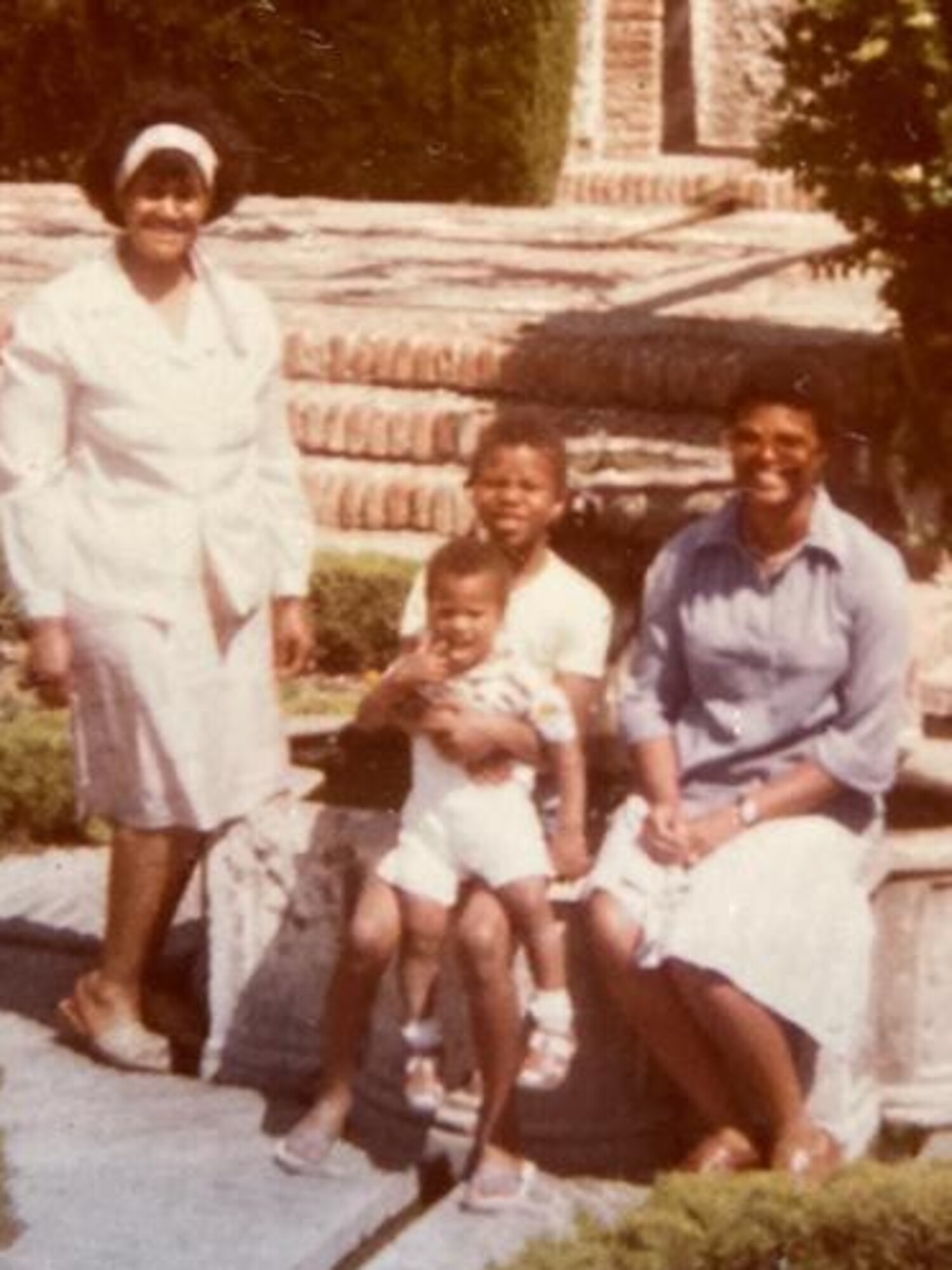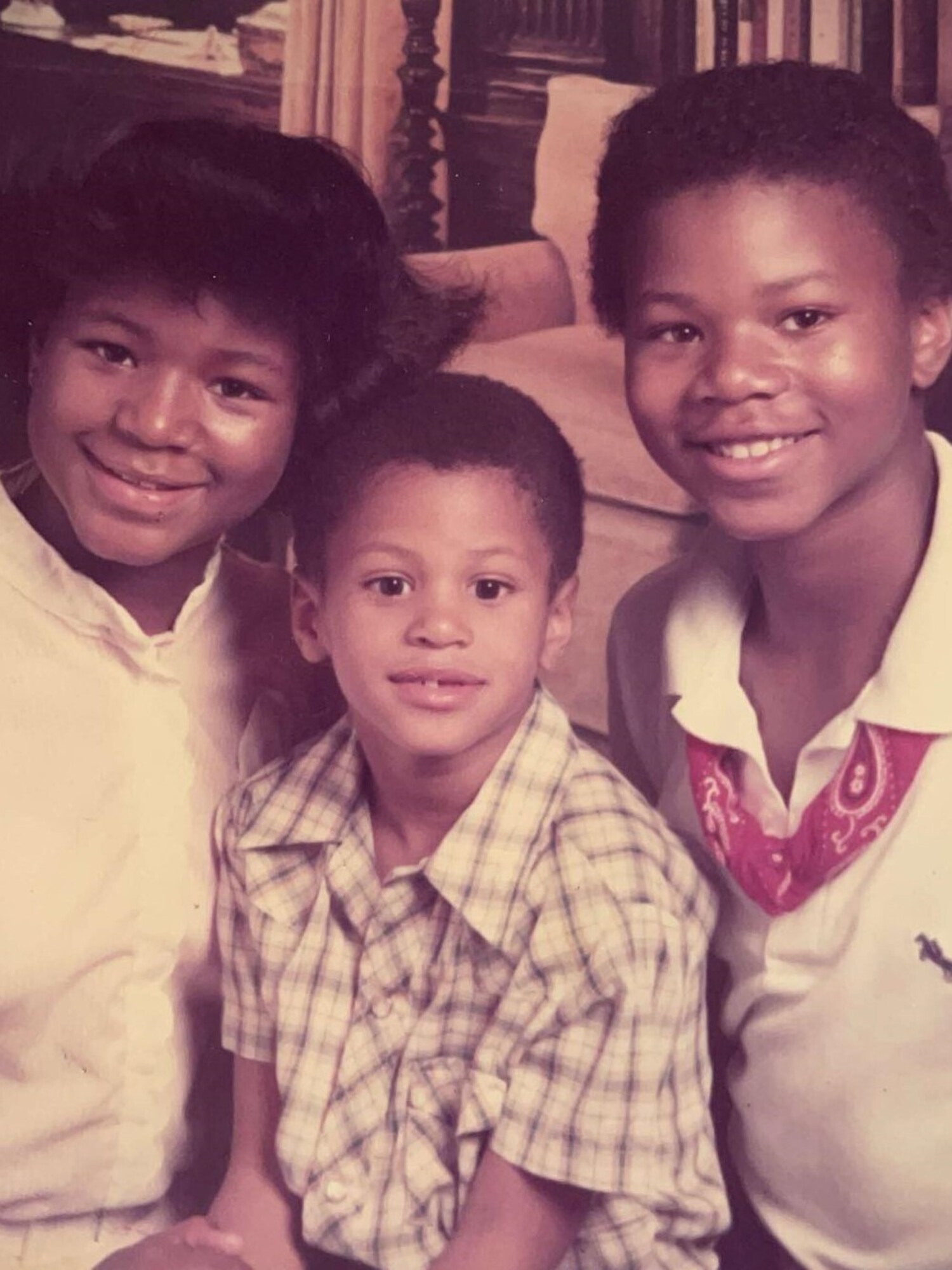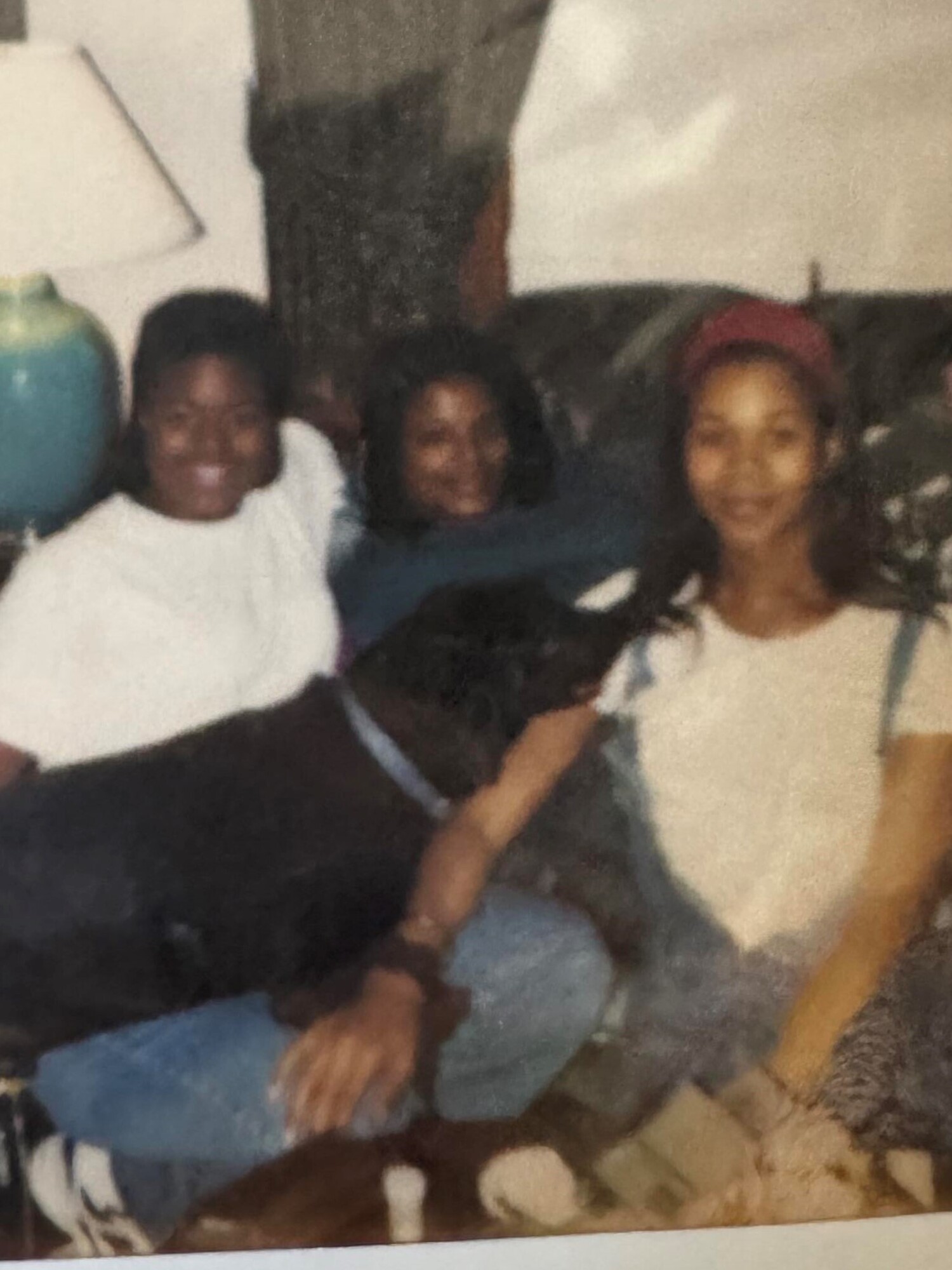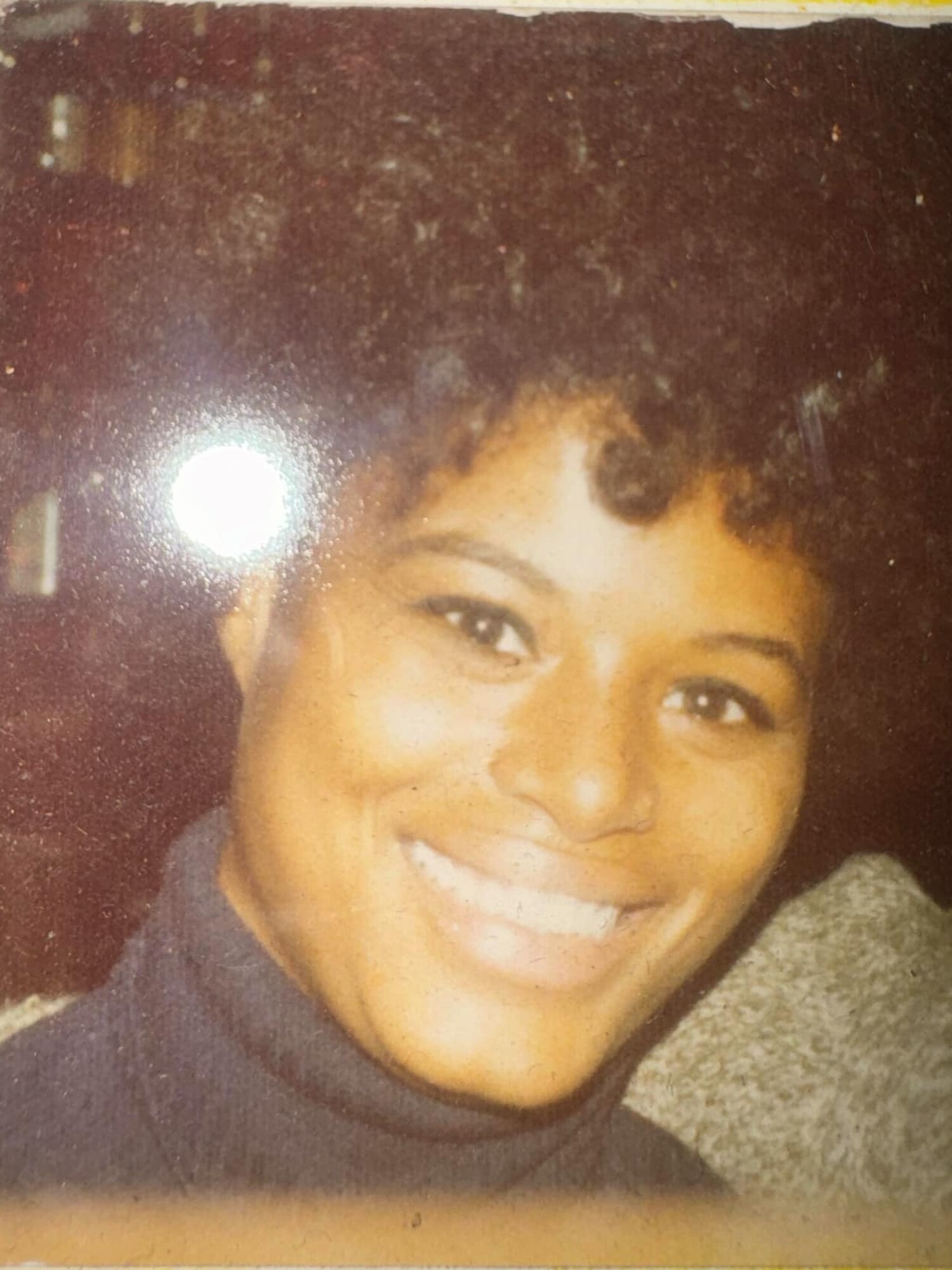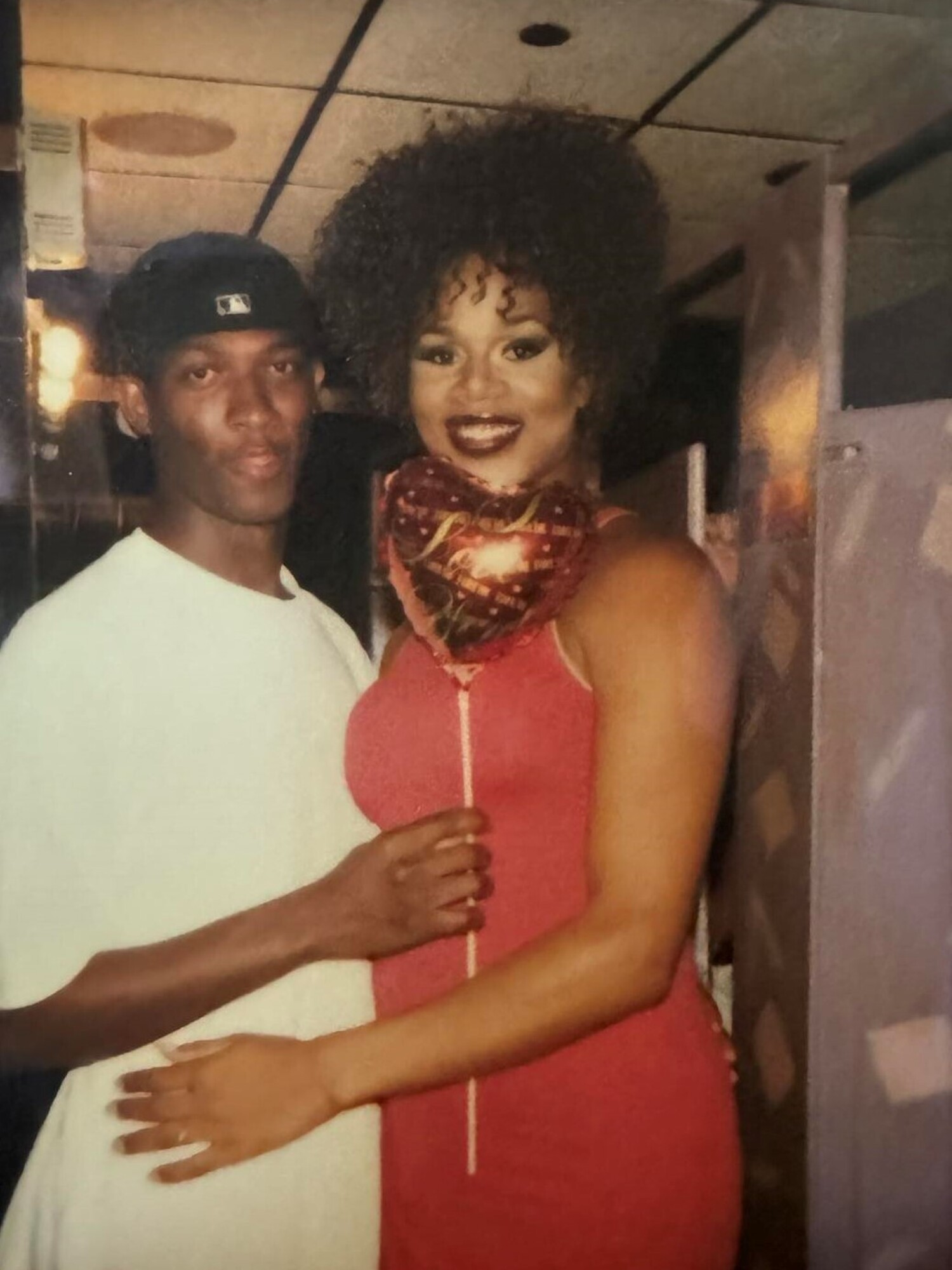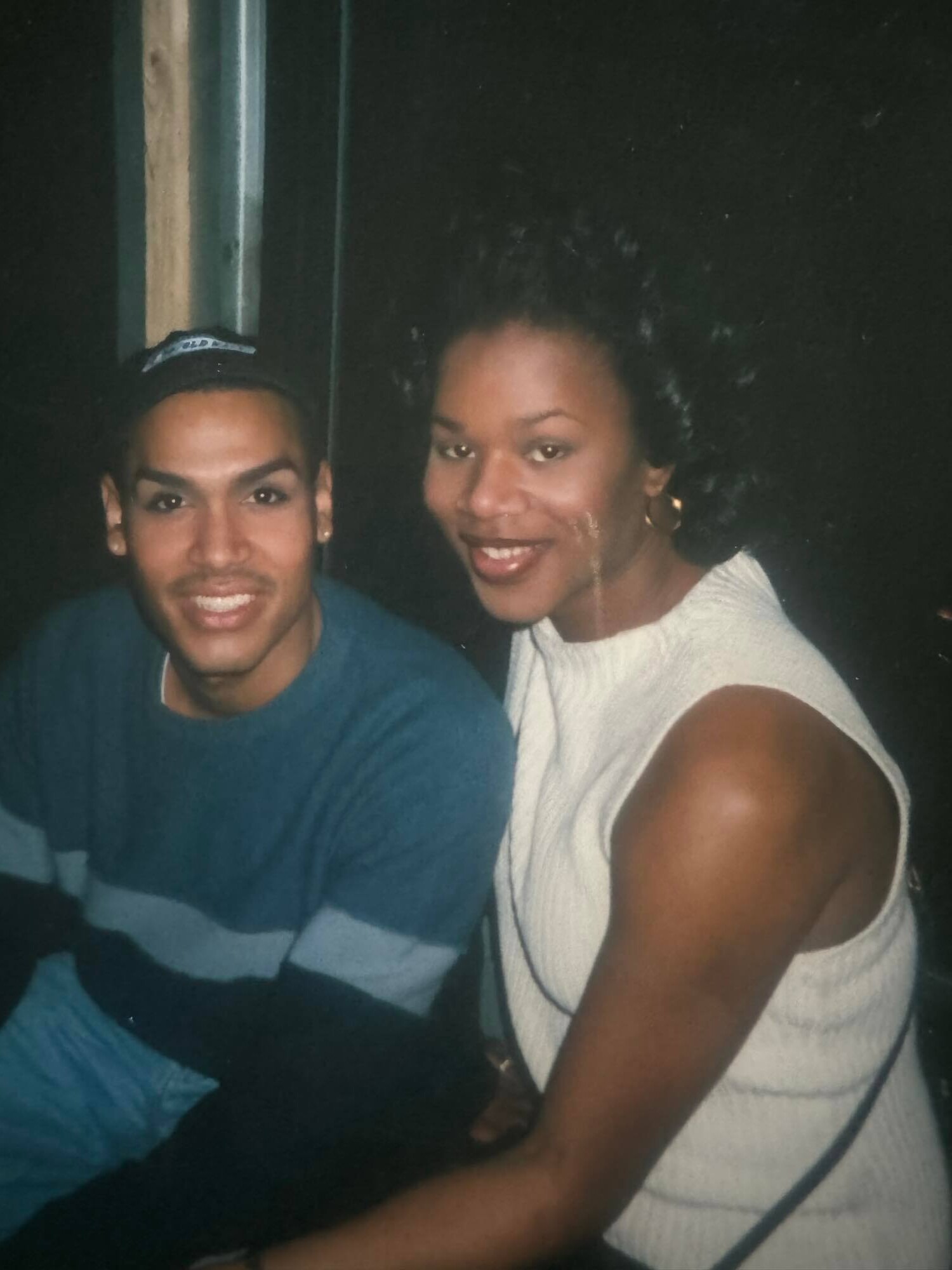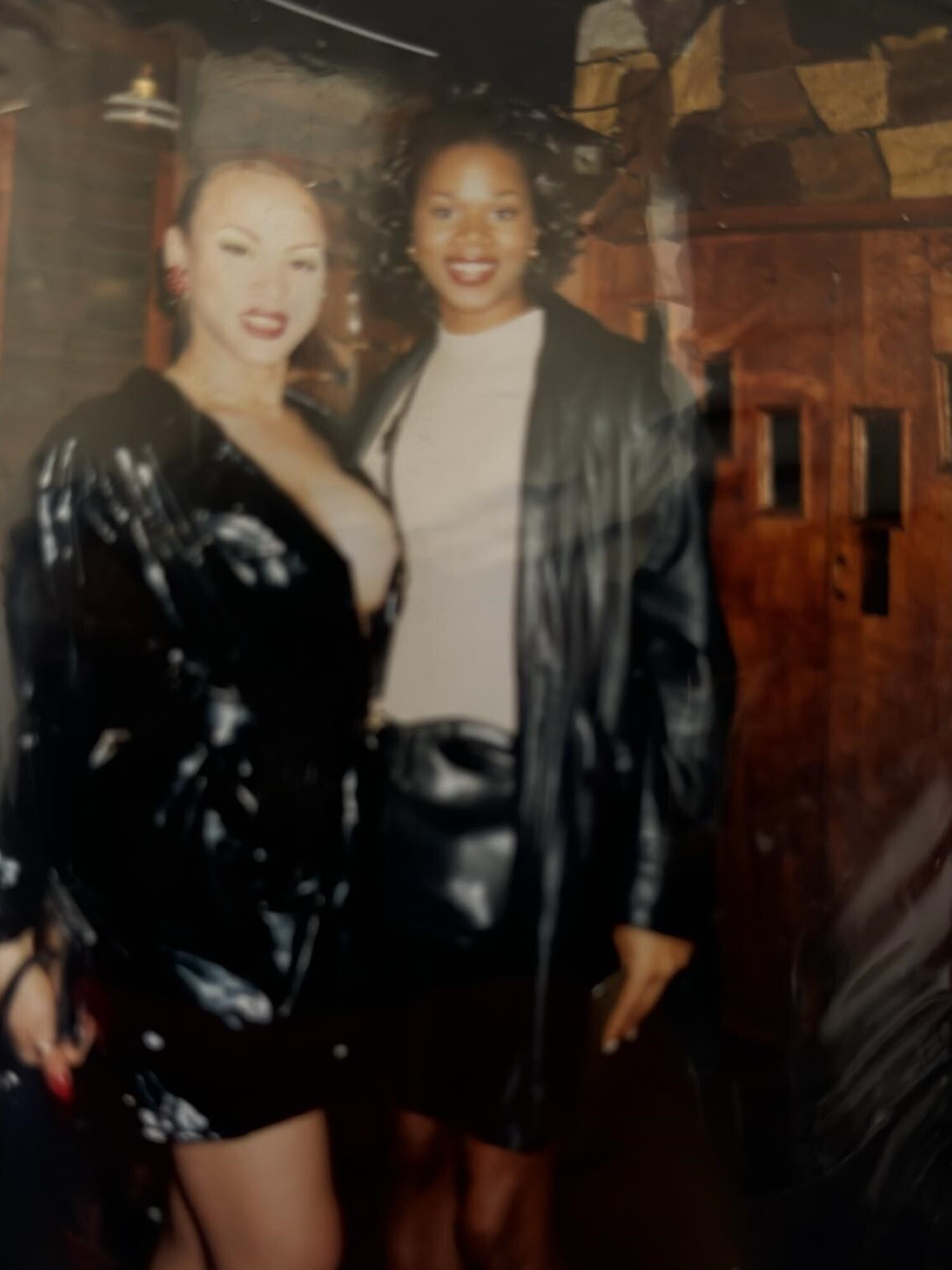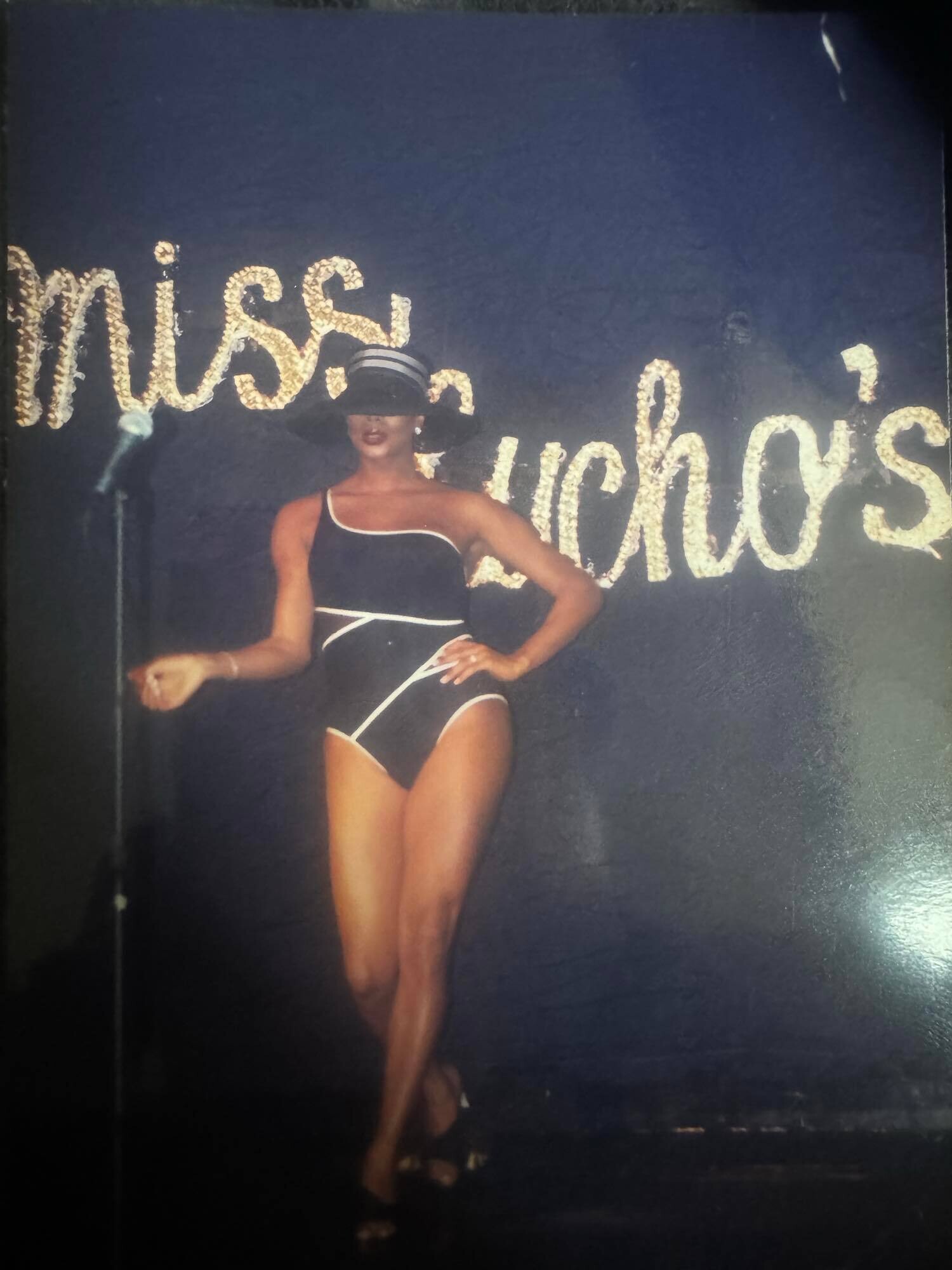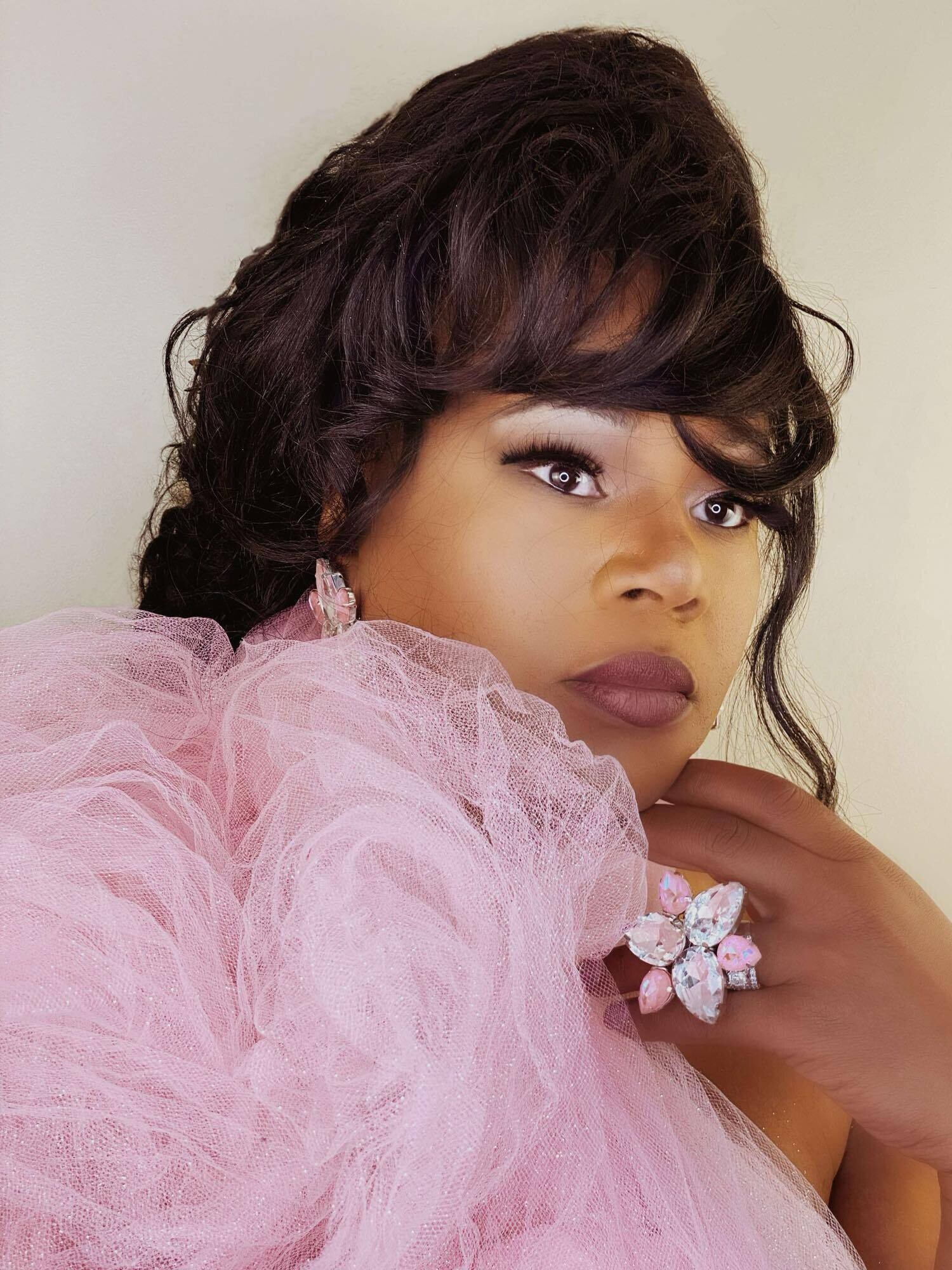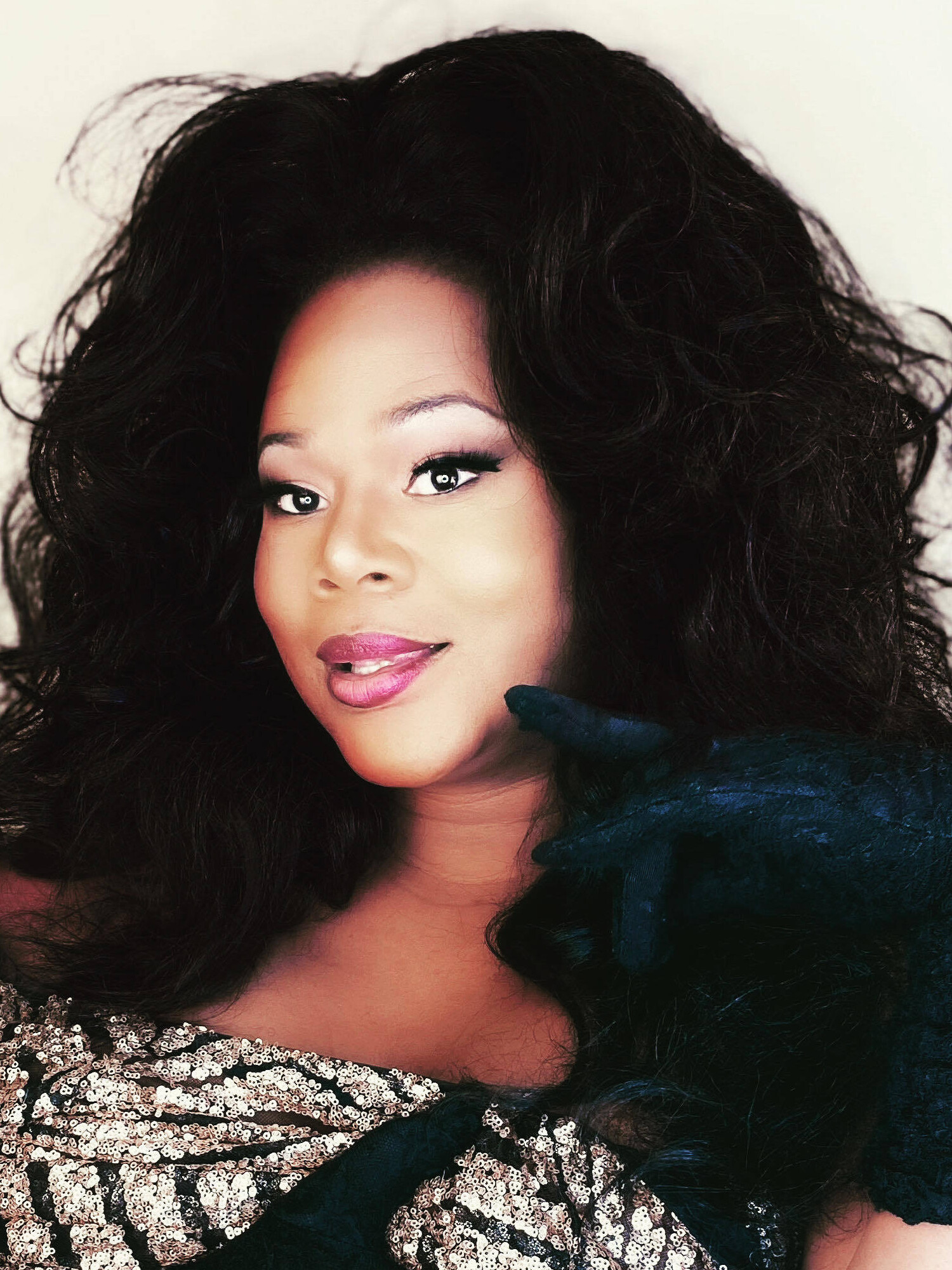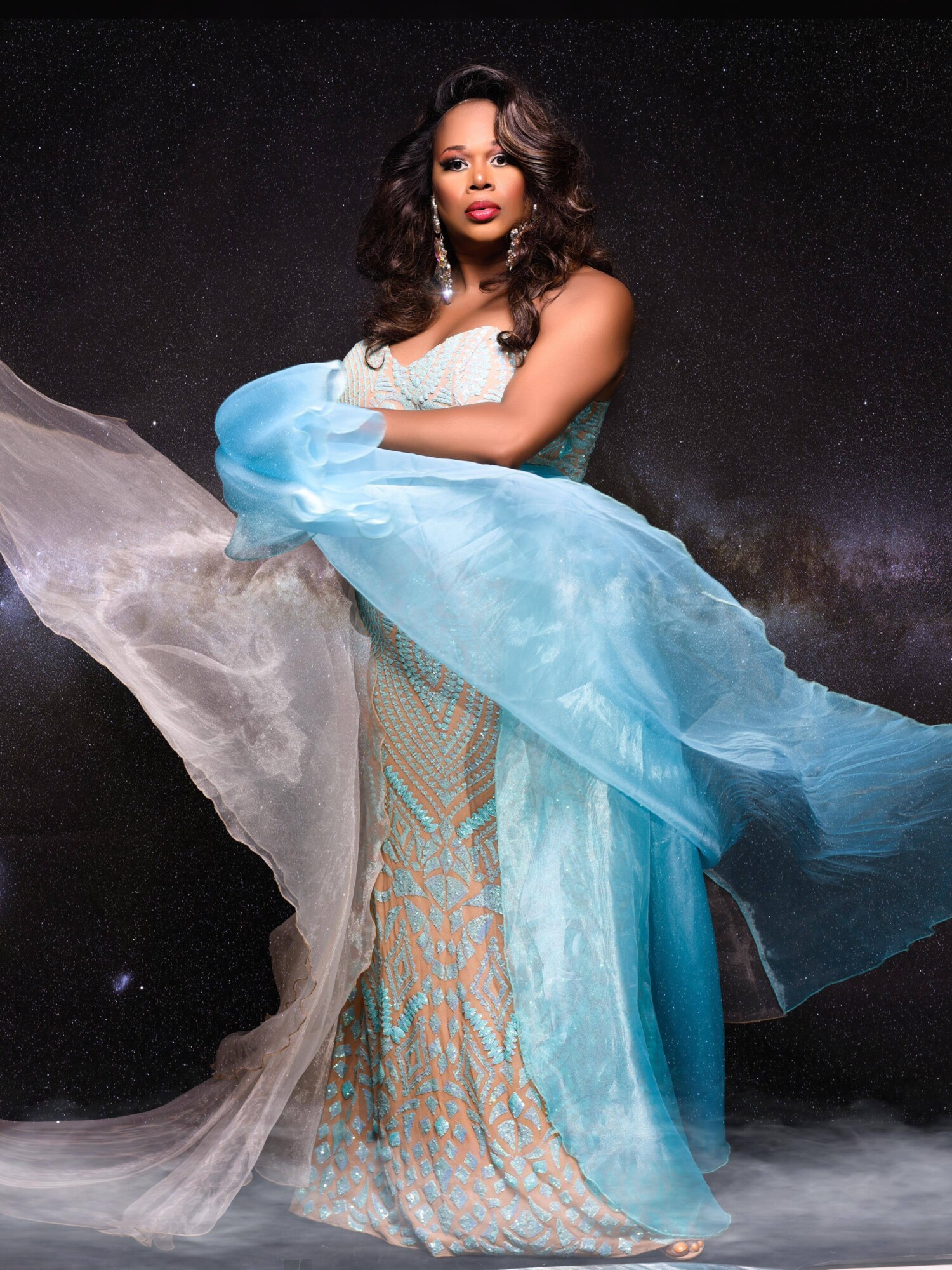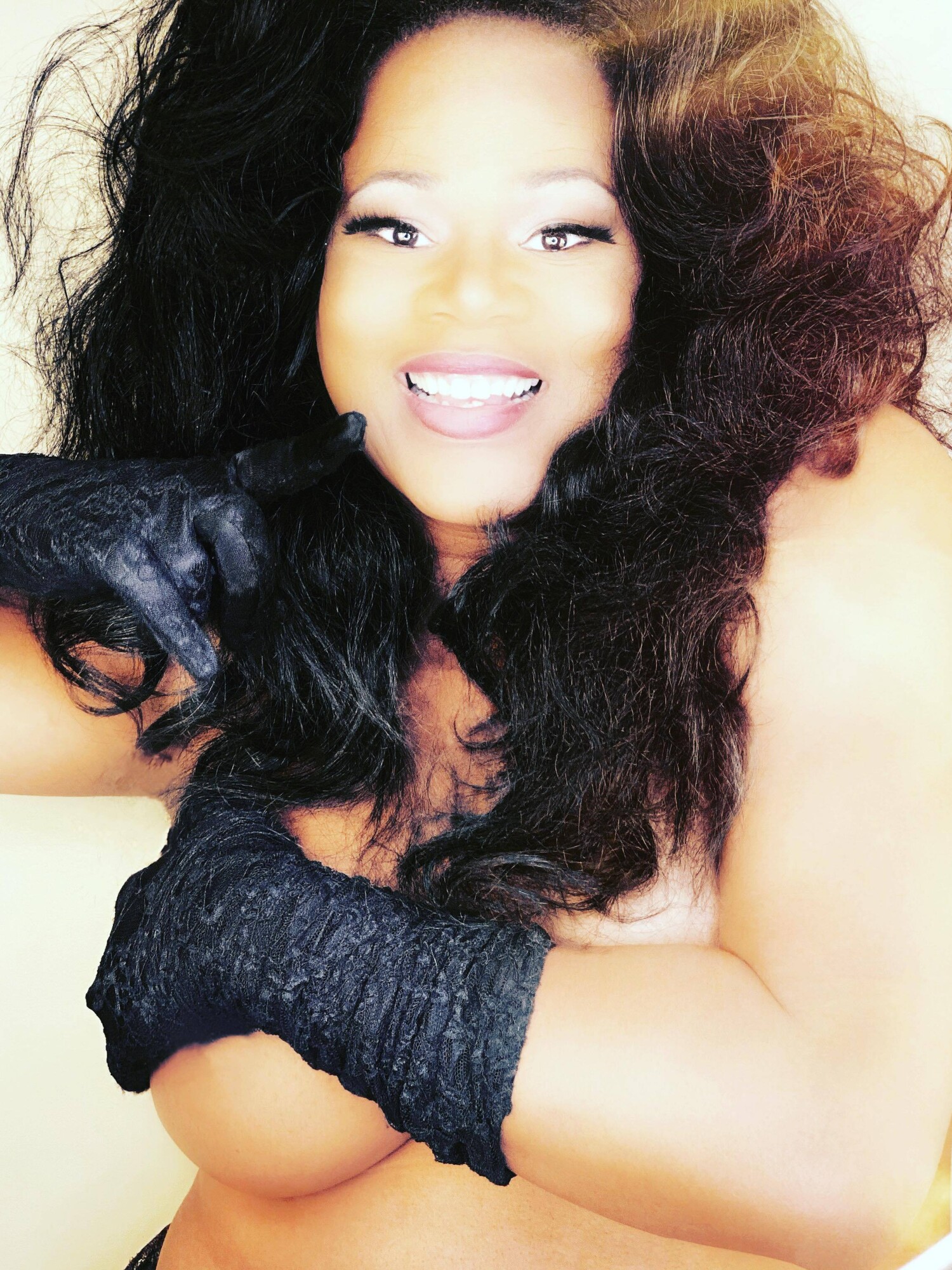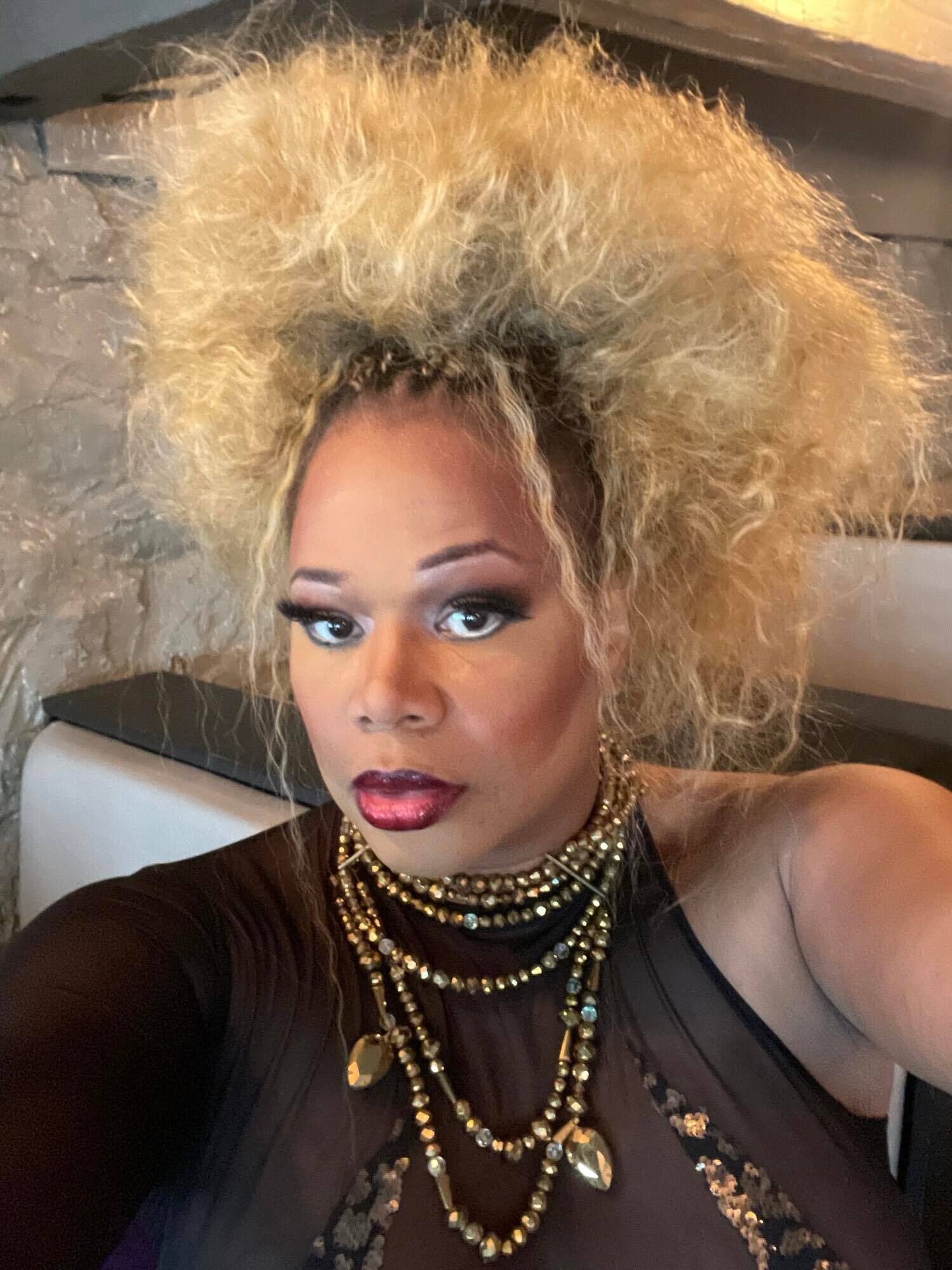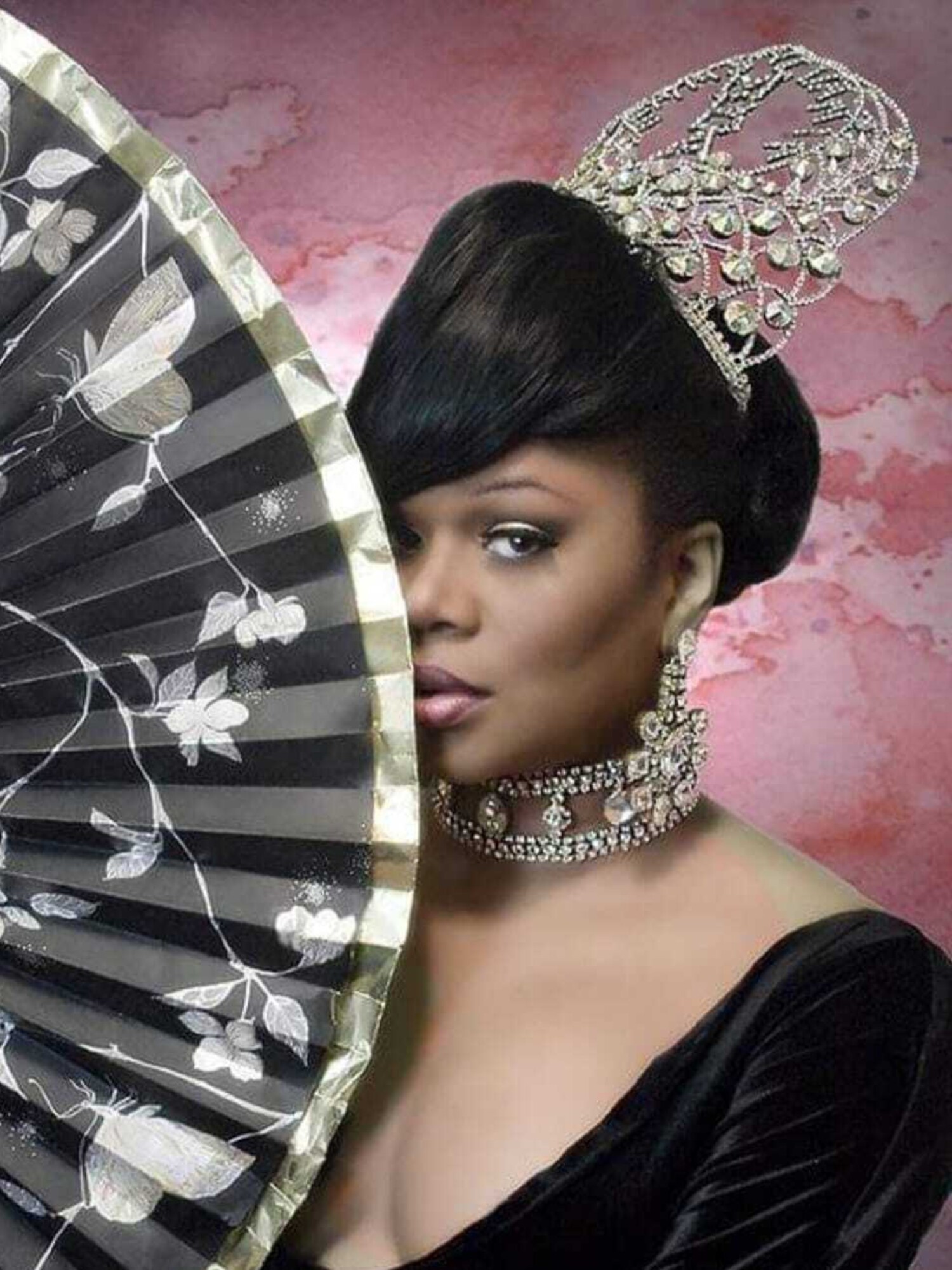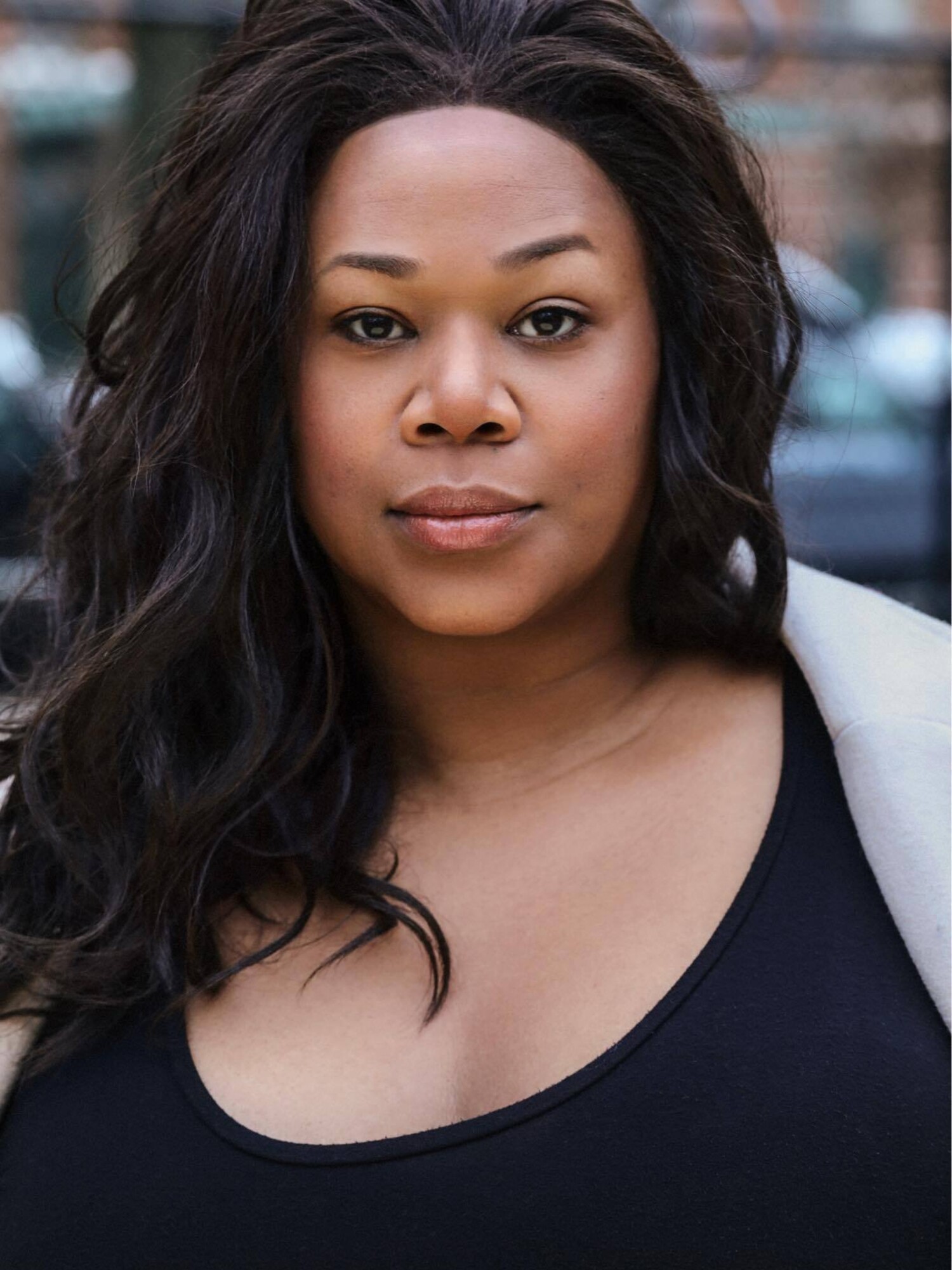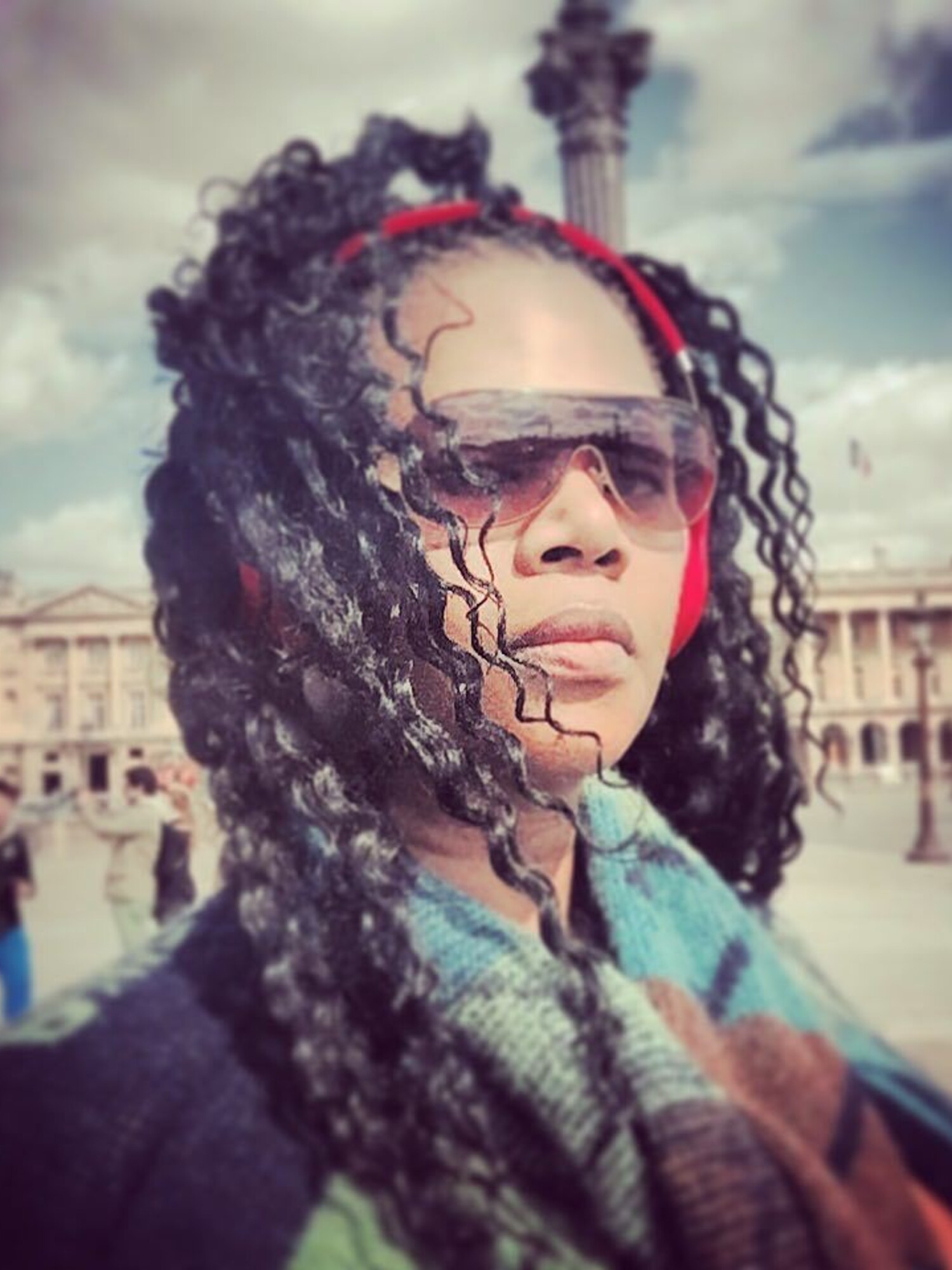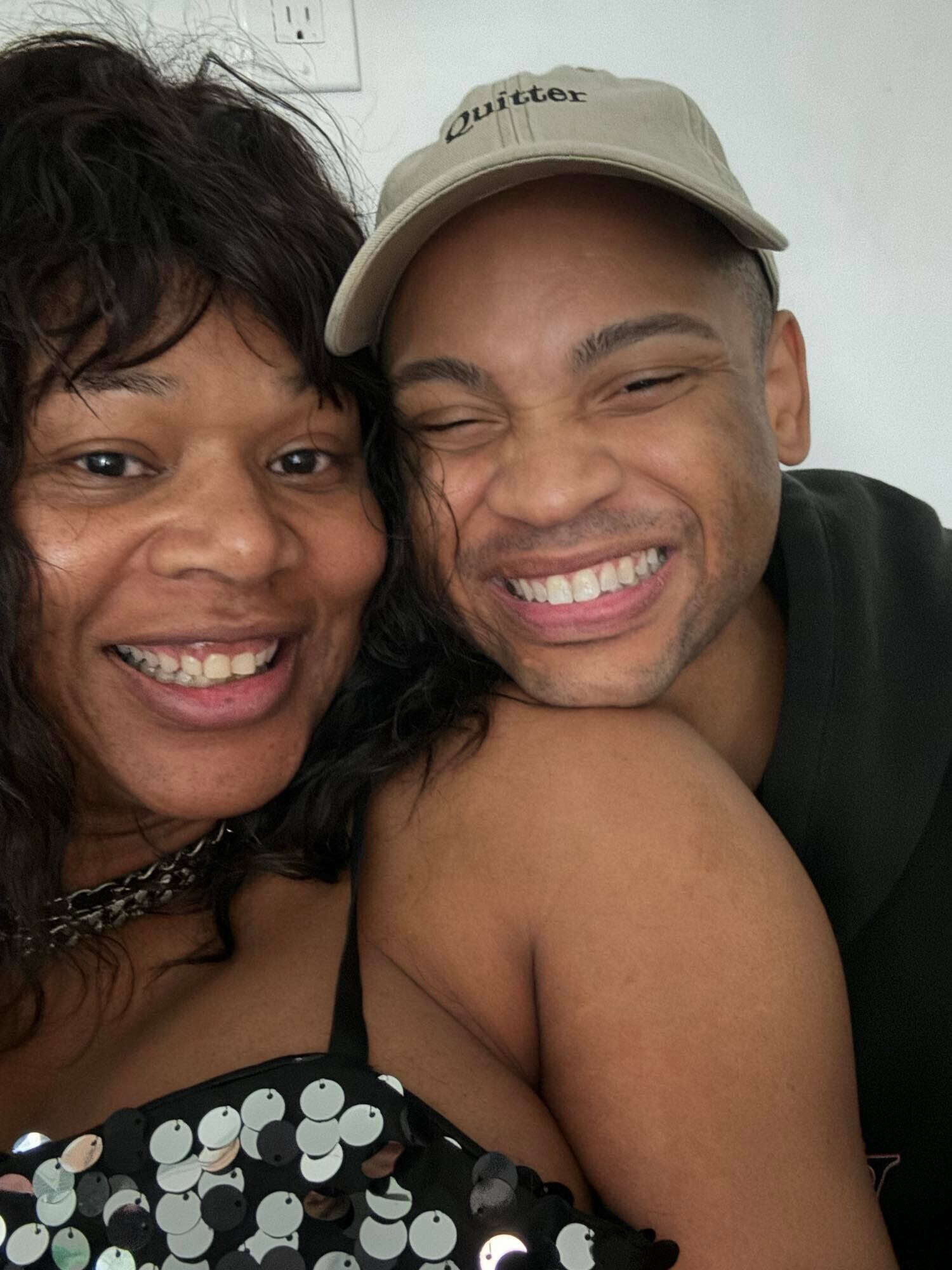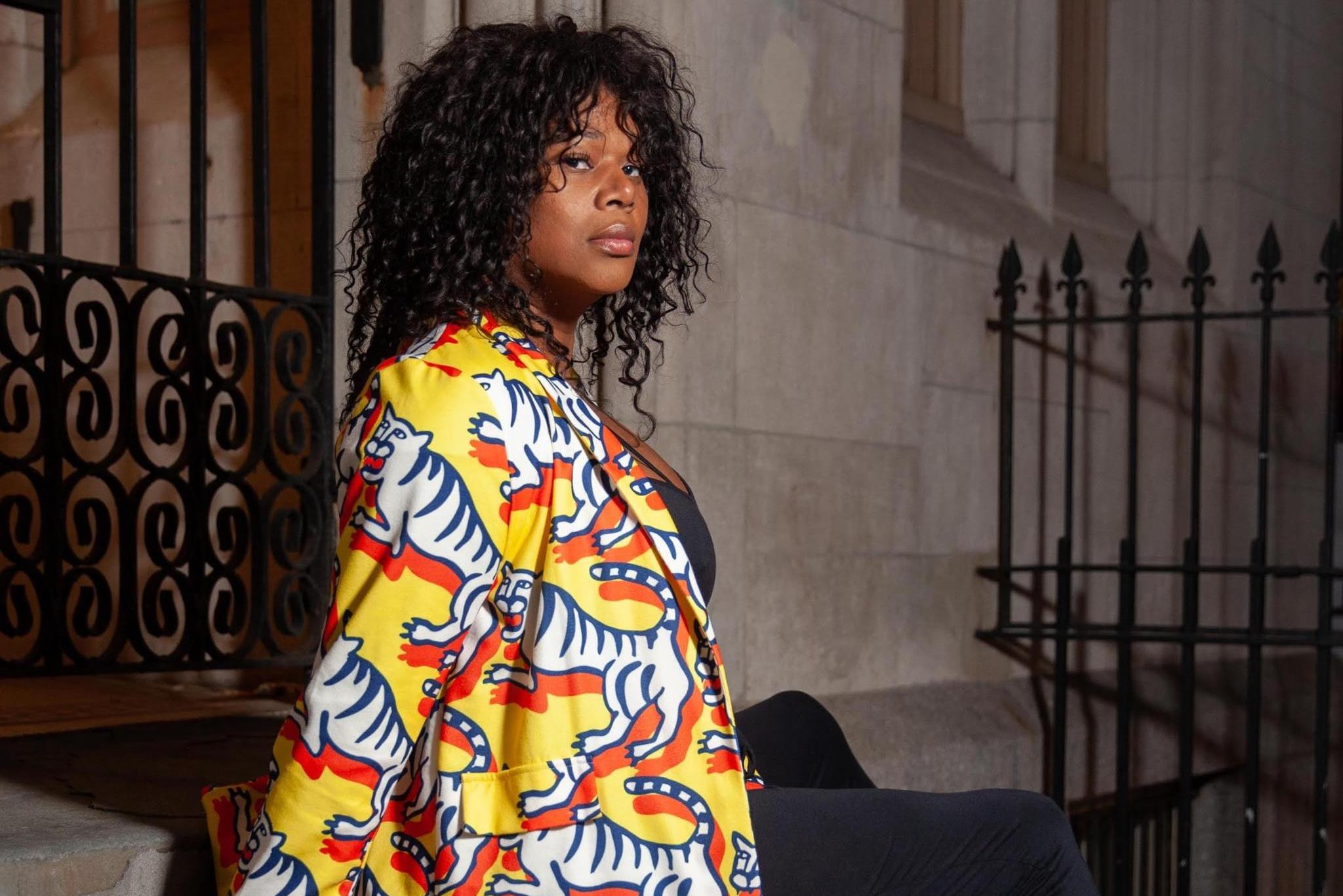
Evanna Breedlove: a lifetime of love and magic

"Every day, I’m fighting to be the best person I can be. I can't give up on me."
Evanna Breedlove (aka Ivana Black) shares her story in her own words.
I was born in Chicago in 1970, but I grew up in Marbella, Spain.
My dad was in the military, and my mom was a military spouse with three kids, myself, my younger sister, and my younger brother. My father was born in Akron, Ohio, and my mother came from Chicago. In college, they were among the first generation to benefit from desegregation.
In Europe, there were just so many diverse types of people, everywhere. You know? I saw drag queens, and gay people, and I didn’t even think anything of it. They were just part of the community. And this was after Franco’s dictatorship. Liberation was pouring everywhere. Everything was flowing because they’d been repressed for decades.
I was five years old, and living in Spain, and I was already trying to push my parts back into my body. I remember that distinctly. I already had this little boyfriend Mario, who called me his wife, loved and cuddled with me, and beat people up who bothered me. We had a little relationship.
Now, I’d already come out saying I thought I was a girl, but you know, back then, that was totally dismissed.
We got to Europe when I was three, and we returned to the United States when I was 12. I already had this idea that I was different. I just didn’t know what it meant.
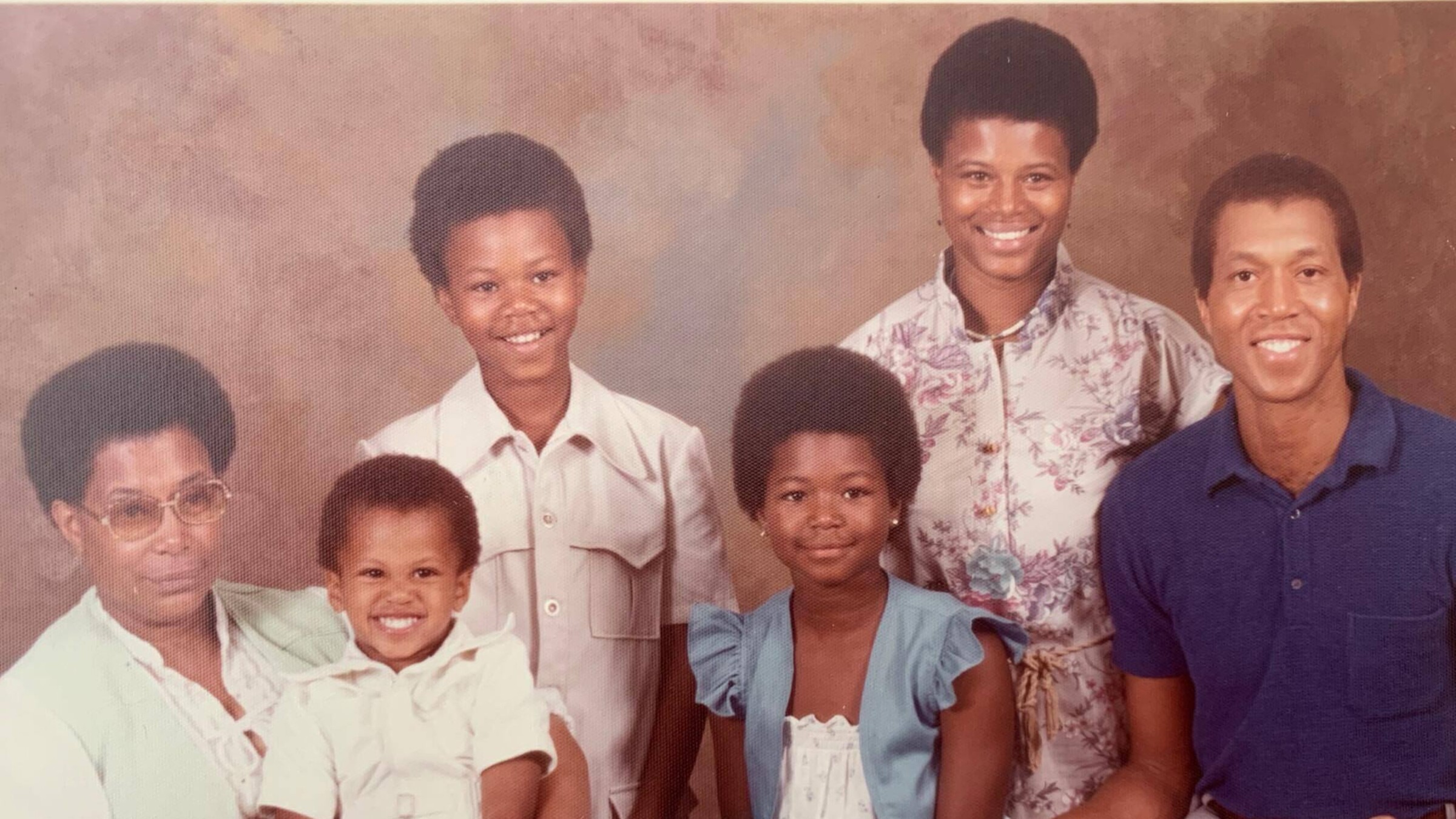 The Breedlove family
The Breedlove family
My mother sent us to the Boys and Girls Club. Sam Williams, the former Milwaukee Bucks player, was the executive vice president. And he’s still there! He was best friends with my father throughout college, and I was friends with his son when I was younger. His son came out many years later.
I was a joiner as a kid. I was in choir. I went to Sunday school. I played basketball. I made great friends with an amazing group of kids. They lived right across the street, their parents were doctors, and yet they smoked cigarettes and listened to rock and roll music, even though we were still in grade school.
The only problem was that I was the only feminine person in the group. I didn’t like boys at the time. I didn’t really know what that meant anyway. I remember wanting someone to be my husband, but I didn’t know about emotional or sexual attachment. So, I hung out with the outcasts and felt like I belonged.
Grade school was crazy when I think about it. I felt like an adult because I was running so many different lines. I was trying to please the teachers, but I wasn’t at the same time, because there was a little bit of racism there. I knew I was different, so I wasn’t afraid to stand out. We’d have casual Fridays, and I would show up dressed really fashionable for the time. My classmates called me the Clothes Horse every year. I’d come in wearing odd stuff, like a Chinese jacket with those little Black Chinese shows.
Well, the teachers told me I was a distraction to the classroom. How’s that for coded? They couldn’t do anything to me, because we had money and we were paying for our education. So, I started having a lot of issues with teachers, at an early age. My choir director even threatened me once.
I listened to what they said in school, and I was scared to go to hell. And I remember thinking, hey, I’m a really good singer. Are you sure I’m going to hell? Because I am really magical.
Outside in
I was growing up in Milwaukee in the 1980s. Of course, I saw, heard, and felt racism. And there’s still a lot of racism in Milwaukee and Wisconsin today.
Here’s a story I will never forget: my mother took us shopping at the downtown Boston Store. We were having this really wonderful day out together. when this lady looks at us and says “the world would be so much better off, if there weren’t so many n*****s.” And here’s my mother, holding my brother, and has my sister and I by the hand, and she’s crying.
And I’m wondering, what does that even mean? Why is she crying? We were from Europe. We never heard those phrases. We live on Grant Boulevard. We’re not exposed to those conversations. We go to private schools. So, everything is stinging, but I don’t know why it’s stinging, and people are arguing, but I don’t know why they’re arguing, because I’d never been around that. I had never heard that word before. I didn’t know what it meant.
Like, this woman just came out of nowhere, and dropped this bomb on us, knowing it would demolish us. But instead of chastising this rude woman, Boston Store employees came over and asked us to leave.
After that, my mother stopped going to malls, and started going to stores in Black and brown neighborhoods. And that’s when we started seeing more urban, more diverse people.
Another time, my mother was just relaxing at home when a drunk man came inside and said, ‘what are you doing in my house?’ My mother was like, panic-ridden, asking him what he was doing in hers! We were playing down the street, and when we came home, we found our mother on the front lawn in handcuffs. She’d called the police, and for some reason, they apprehended her. Our neighbors came outside and confronted the police. They wouldn’t uncuff her – even though she the victim of a home invasion – until enough neighbors vouched for her. Finally, they took this man away in his car.
Later, we got the excuse that he lived on a similar corner lot and had made an “honest mistake” coming into our house. That sure didn’t take away the mental picture of my mother in handcuffs!
My sister and I would go to camp every year with the Boy & Girl Scouts. I saw people who I knew were gay, and they were so supportive of me, but it was a silent form of support. Back in the day, Milwaukee was so covert: nobody really talked about it, but they fostered their own people, and took care of each other. For example, when I finally came, my parents sent me to therapy hoping this would “help” me. Unbeknownst to them, the therapist was gay himself. And he told me, ‘there’s nothing wrong with you, and I am here to help you be exactly who you are.’ Some gay kids got sent to hypnosis, conversion therapy, and all this other stuff. He never let that happen to me.
I wish I knew how to contact him, so I could thank him for helping me. He never let anyone “program” me.
Almost famous
After Mount Calvary Lutheran grade school, I wound up at Milwaukee Lutheran High School. I was on the swim team, and on the track team, and qualifying for state competitions. I was still going to church. But that’s where I started to think I was really different from other people.
I had such an eclectic group of friends. They may have come from other Lutheran schools, but they were definitely the outcasts of those schools. I got to know Thomas Boyd, whose father owned auto shops in Milwaukee, and Tisha Love, whose parents owned Love’s Liquor Stores. I met Chris Varona, because our fathers both worked in healthcare, and we became best friends.
And now, we were scattered between all these high schools, all over Milwaukee.
(And would you believe, two girls from Milwaukee Lutheran High School recently reconnected at a class reunion, figured out who I was now, and messaged me? That happened!)
I’d been doing some acting, modeling, and fashion shows over the years. I found out about a Boston Store shoot coming up, and I wanted to be part of this so badly. Yes, even after all the racism. I ended up auditioning and got into the shoot. I begged my parents to let me do it. My grandmother and my mother were on board, but my father was just not having it. He knew I was very feminine, and very talented at everything I did, but he had no idea I was questioning my sexuality. Well, I wound up in TV commercials and print ads, and people started to recognize me in real life.
And then, my friend told me about this meeting they used to have at the Milwaukee Public Library downtown. It was known as the “triangle meeting.”
So, I went down there to check it out. I remember sneaking around the library, hoping I didn’t see anyone I knew, hiding behind the bookcases…. And then, when the meeting was about to start, we’d run into the room and close the door! We only wanted to be seen by the other people at the meeting. It wasn’t really safe to be seen by anyone else.
Well, that meeting sure was a springboard for me. I met different people from all over Milwaukee and learned about all the teen clubs. Those teen clubs made high school so wonderful for my generation. I met a lot of people at those clubs that I’m still friends with today.
I also learned that a new high school might be opening. Milwaukee School of the Arts opened in September 1984, and I was there at the beginning. I graduated in the Class of 1988.
Some people say the internet made it easier for LGBTQ youth, but it has actually made it worse. It’s always on, giving the world a look into your life, that you might not want the world to have. Those “triangle meetings” were such an escape for us back then. Back then, you could just get away from your everyday high school life and be with your people.
Those meet-ups were lifesavers, because at the time, there was nothing. NOTHING. There were not even books in the library about sexual orientation, let alone trans identities. I had no idea what the hell a “transgender” person even was. There was nothing.
So, whoever started that meeting saved countless lives, so many, many lives.
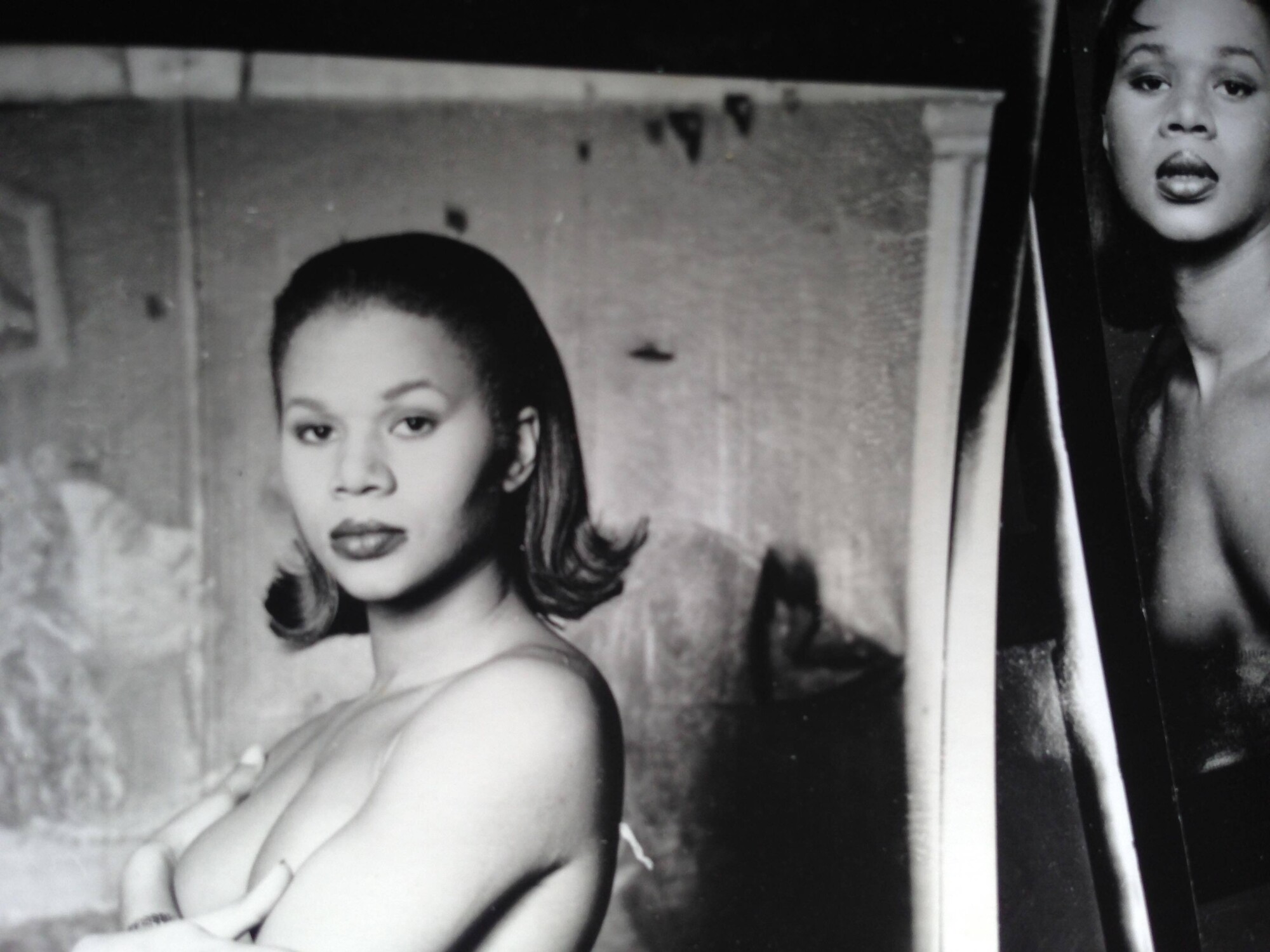 Ivana Black
Ivana Black
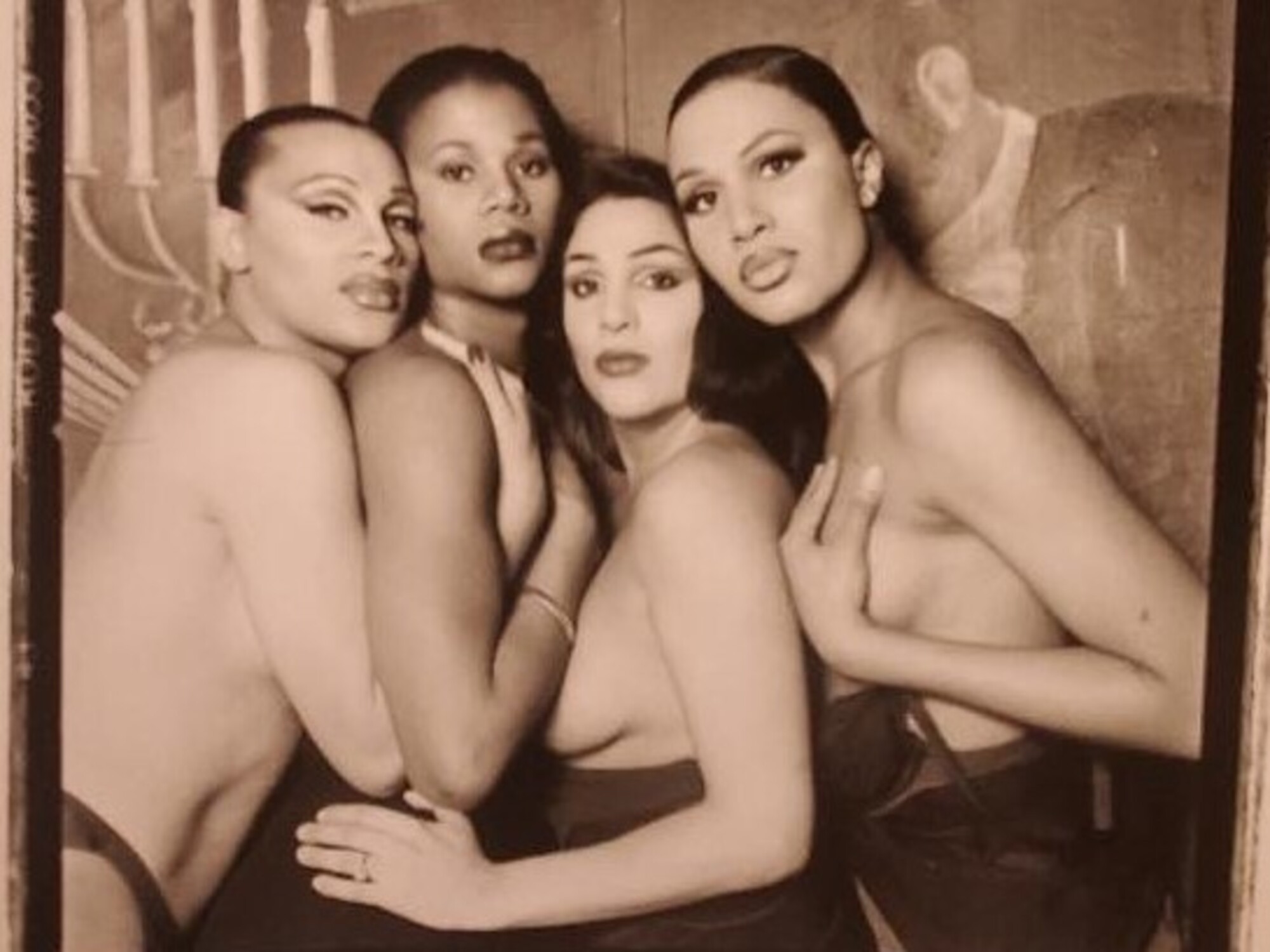 Ivana Black and friends
Ivana Black and friends
Living the teen dream
They called us the rich bougie gays. We drove around Milwaukee in a convertible. Everyone knew it, everyone knew us. Those were the gays! We used to go to the clubs, all of us. Chris Varona. Fentress. Kevin Meehan. Thomas Boyd. Chris had all this hair, and such a distinct look, and came across so feminine. I wasn’t even that feminine back then. Well, Chris is a doctor in California now, and he is so butch! Fentress is in Atlanta now. Kevin Meehan is in Madison. Thomas Boyd is in California.
We were really out there. We went to Lake Park Pavilion dances and house parties on the East Side, where you could be as different and as queer as you wanted. I wore skirts with combat boots and danced all night to Dead or Alive and Erasure. We were kids, so we weren’t threatening. It was an amazing time to be a teenager. A terrible time and an amazing time all at the same time.
As I got a little older, I got a fake ID, and started hanging out at the bars. I went to 219, Phoenix, Triangle, you name it. I was running the street, but I was on the street, because at 17, I started having more and more problems with my father. Finally, my mother was like, your father wants you to leave, but don’t worry, we’ll get you an apartment. What? Yes, in high school, I had my own apartment.
And let me tell you this, this was the legend, and the kids will tell you the legend. Honey, after hours, you can always come to my house; after the club, you can always sneak in, because you’d have the directions memorized. Everyone knew how to get to my house, and put this on the record, because “the water is pleasant on Palmer.” You went down Water Street, took a turn on Pleasant, and a turn on Palmer. And there was my building.
Chris Varona moved into one of those walk-up condominiums in Yankee Hill. And he’d come pick me up, and we’d drive around Milwaukee in his convertible. Our friend ErWee lived next door to Juneau Park, so we’d go over there, spend the night at her house, and sometimes we’d “accidentally” walk outside and see everyone in the park. She was playing for an orchestra, and I was studying for the ballet, and he was doing piano concerts. So, we were all involved in the arts, and teen nightlife, and having so much fun.
We’d go to the teen clubs, like Park Avenue and Club Marilyn, and the Lake Park Pavilion dances, and we could also go to the grown clubs, because we had fake IDs. When we were living at home, we’d tell our parents we’re staying overnight somewhere, and I’d buy something at Boston Store and return it for the cash, and then we’d go stay at Days Inn Chicago and go to all the Chicago clubs. I’d go with Basia to the Warehouse, where house music was born, and then join my other friends at Medusa’s. Every night was fabulous.
I remember one night, oh lord. We went to the county western bar in Racine and got a hotel nearby. There were four or five of us. I remember the hotel manager took the doorknob off our room, so we couldn’t get inside! They said we were partying too loud. I mean, we were all 17-18-19 years old. We didn’t care. We were crazy.
I was dating one of the bouncers at Club Marilyn. He was a buff, attractive white guy, maybe 20 years old. True to the times, it was a nonsexual dating, but I still felt for him. And then I go to McDonalds, and there’s his dead body. He was killed in the parking lot of McDonalds, and not just any McDonalds, but the one we all used to go to after the club. That was shocking.
The black velvet rope
We experienced some racism at Milwaukee bars. The worst place was Triangle. Oh, my God. They just did not like Black people at Triangle. They really, really did not want us there. That fat m*therf*cker was so evil. Al Thomas.
The only thing that saved me was my twin. That’s what we called each other at the time. Kevin Meehan was the young fresh white boy that everyone wanted, honey, so when I went out with Kevin, I had no problem. Everyone wanted to let me in. I didn’t start getting any respect at Triangle until I started doing drag, and they started doing drag shows, and then they had no choice but to let me in. I worked everywhere, and they’re suddenly like, why are we not letting her work here? It’s obvious now why they wouldn’t let me perform.
They wouldn’t let any of the Black girls perform – Tracy Ross, Basia Bazaar – but they would let my friends Rudy D’Angelo and Jackie Roberts perform. We were friends since grade school, even though we went to separate schools, we were part of the same little group. We connected through my sister.
Eventually, they let me perform. They were like, this is the best choice. She hangs out with everybody. She speaks white, she talks white. She’s OK. Really.
It was the same thing with M&M Club. They didn’t want a lot of Black people in there, but they let me in there, because I spoke right and acted right. Everything they wanted; you know what I mean? I grew up in a different place than other people, and I came from a different education than most people in Milwaukee. My arc was completely different. But it didn’t make it right.
I remember the first gay prides and how segregated they were. They had MAP Fest, over by the gay clubs, and all those little bars had events, but they weren’t exactly open to everyone. Not everyone was welcome to perform on the main stage.
So, I’m sitting there, at the main stage, and I’m dressing a queen, and she’s yelling at me because it’s taking me too long to dress her. But the reason it’s taking me so long, is because I have to figure out how to string her IV through the gown, before she can put it on. Because this queen is literally dying of AIDS and still going out there on stage to perform for these people.
Oh, my god. That moment. That was Ginger Spice.
I actually went to after-parties at Jeffrey Dahmer’s apartment. It was all Black and brown people at those parties. He had these barrels, like coffee tables, in his house, and we’d set our drinks on them. We all noticed the smell, but we kind of ignored it. We never imagined what was inside those barrels. I would see those missing posters at 219 and later realized that I was at the place where people died.
219 didn’t really highlight a lot of Black talent when I first came out. They had some black girls, but not many. Phoenix was where all the Black people went. That was the place. They played all the good dance and house music, but they played R&B music before it was a thing. Black people knew the big clubs would give them a hassle, so they created their own little bars and clubs all over the city that rivaled the South Side.
And do you know why they started letting us in? It was AIDS.
When AIDS started in the later eighties, people started dying in record numbers. So, what happens? There’s nobody going out. How do you solve this problem? The owners got laxer. And that’s when we took over. The scene started changing. Hispanic and Black people became infused into everything. All these bars started popping up because you have this influx of people. Everything became magical over there once everyone was accepted. And now, there’s people flooding in from everywhere, and everyone started going out again.
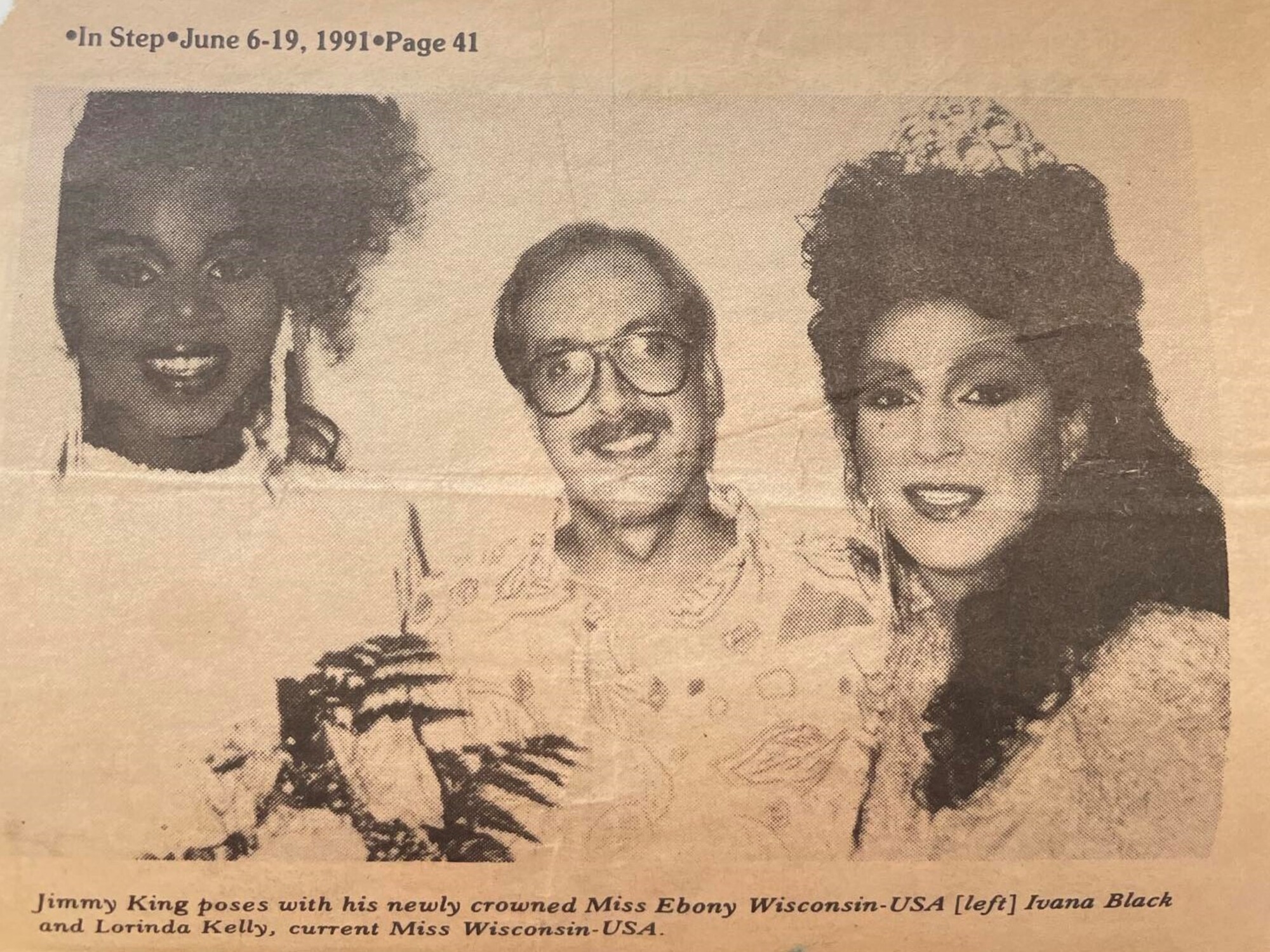 Ivana Black wins Miss Ebony Wisconsin
Ivana Black wins Miss Ebony Wisconsin
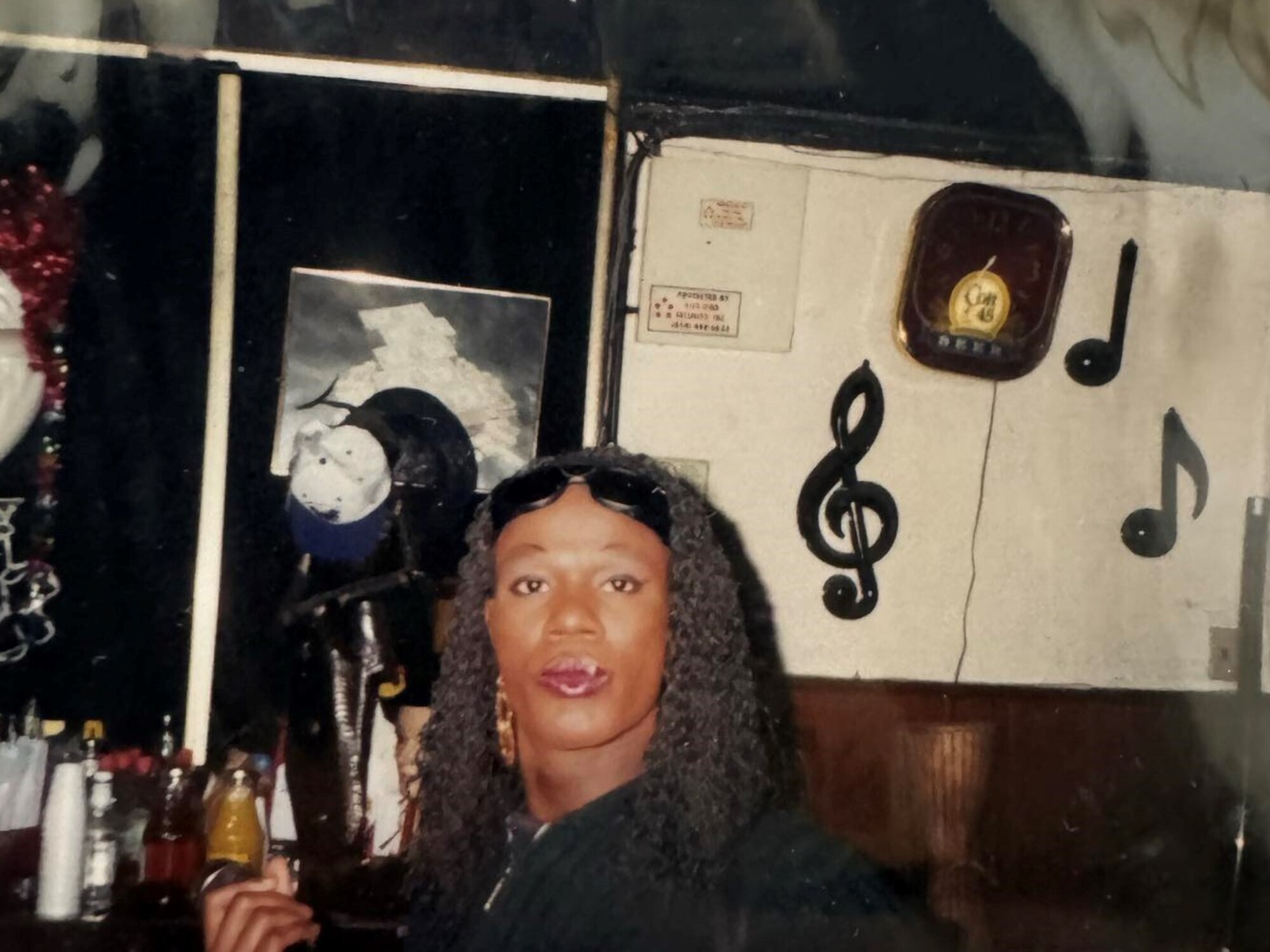 Basia Bazaar, close friend of Ivana Black
Basia Bazaar, close friend of Ivana Black
The last generation
My friends and I went to private schools, and we were a little sheltered from the truth. We didn’t really see AIDS coming.
We thought it was God taking vengeance on us, because we didn’t know what was really happening. If you read the papers, or heard the news stories, you’d think it was the end of us all.
And we were still just kids. Once we started hanging out in the club, we started watching it in real time. You’re meeting this person, or that person, and you come back a week later, and some of those people are in the hospital and others are already dead. So, there’s less and less people you recognize, because so many people were dying, and here I am still in high school.
And I’m watching all this unfold. I’m watching beautiful people’s bodies slimming down to nothing. I’m trying to put an IV in a beautiful woman’s gown, knowing she is not long for the world. And it just feels like everything is ending, like time is running out.
That was my introduction to drag: dressing dying people, because even their friends were afraid to touch them. Can you imagine?
I’d seen drag queens, but I didn’t really talk to them. I was a boy, I was a model, I hung out with boys. And you know, it was all the pretty boys who dressed nice, rode fabulous cars, and got all the attention. Dominique Mahon took me under her wing and started helping me with drag. Mimi Marks was the first person to paint my face. She was so shady! She painted half my face, told me she was done, and I had to do the rest myself. She made me learn. Today, girls always say that I do my makeup so good, and it was because I had to learn.
So, on a dare, I did a drag show at 219 when I was 19. I performed “Vogue” by Madonna wearing a beautiful outfit from Boston Store, and a horrible ponytail that turned green. I was so Bougie; I chose the name Sabrina Boucheron. Sabrina was named after the movie Sabrina, and Boucheron was after the largest diamond in the world. The kids were like, oh look at that expensive, rich-looking outfit, and I was like, oh, this is amazing. And then I won! I was underage, but nobody said anything.
So then, I started to do drag, even though it started as a joke. I wanted to be Boucheron, the largest diamond in the world. When I used to come out, I would wear pearls, fur coats, satins, silks, all that. I thought I was Dominique Devereaux from Dynasty! I swore I was Dominique. I swore that was me. I was Electra Abundance walking into the room long before Electra Abundance existed. That was me!
There's a famous photo of Ivana Trump from a family ski trip, where she is wearing this little white snow outfit. Just a beautiful, elegant, flawless white outfit. And I thought, that is totally me, except she is white and Eastern European. My friend said, "she may be white, but you know you're the black version of her." So, I became Ivana Boucheron.
Once I started doing drag, a lot of my friends pulled away from me. I felt this separation fall upon me. I realized there’s a separation between the gay people, the queens, and the trans folks.
When everyone started dying, everyone started to unite. You couldn’t be gay outside the gay clubs anymore because everyone was so scared of HIV and AIDS. So, naturally, the community came together in those spaces.
And now, it’s decades and decades later, and HIV is not the stigma it once was, we have marriage equality, and people feel free to be out everywhere. So now, you hear that we don’t need the gay clubs anymore, and all those divisions are coming back. This is the arc I’ve watched throughout my life.
We had to come together against HIV/AIDS. All we had was each other. Who are you going to party with? Nobody wanted to be near you. We couldn’t even go to the hospitals – they didn’t want to touch us. This is what we lived through. The only place we could be happy, free, and ourselves was the gay clubs. During the day, we had to pretend to be someone else, and get through it as best as we could.
People often ask me who my role models were. Within my three years in high school, a whole community was wiped out. A whole generation. So, when people ask, who did you look up to when you were growing up? I can’t really tell you. My generation had to figure out how to do it ourselves, because all the people who were supposed to teach us were already dead.
We felt like we were the last generation. But we were also the best generation because we became the non-sexual generation. We were all so scared of sex. We had second-base sex with kids our own age. We didn’t go near adults. Even when I was an adult, I was still scared of having sex. So, we became a generation that kissed people on the cheek and hugged them in public.
Sex was so fearful for most of us because the outcome was death.
We chose magic because we wanted everyone to be happy, feel love, and stay alive.
I’m hoping, in the future, that we can do a reunion. We should, we absolutely should. Bring in everyone, from generations, from all around the country, and invite all the youth from Milwaukee to dance with us. Bring it all back -- even for just one night. I really hope we do.
And I remember them dying, one after another. I remember the health care field being taken over by lesbians and trans women. The gay men didn’t want anything to do with HIV/AIDS care. They were too scared. So, we were there, when nobody else wanted to be there, holding the hands of dying men all over Chicago. And I just kept on doing that. And that’s how I grew up.
Suddenly, we had these breakthroughs.
We started seeing medications that worked. Patients started living longer and longer. New infections started to drop off. People stopped dying. A new wave of HIV/AIDS specialists came in from overseas. And the next thing, you know, all the trans girls are being let go.
Some questioned my choices of work, like retail and fast food. I know it sounds weird, but I just felt so comfortable there. I didn’t need to be fabulous anymore. I was OK with just being a girl there. I felt like a layer came off me, where I’m no longer trying to be extra, because I was happy with who I was. I’m no longer doing all these extracurricular activities because I’m really comfortable with who I am.
I stopped doing drugs. I didn’t really drink anymore. I was happy.
I did so many things in Chicago. I did fashion shows and merchant modeling with Quinton De’Alexander. My friend Christian and I had an apartment that was beautiful – huge, two bedroom – and I loved it. I gave it to Quinton when I moved out, and he still lives there!
During a trip to New York, I met Marsha P. Johnson. While doing a Modeling Association of America fashion show at the Pennsylvania Hotel, I took a walk down to the piers. And she was just there, being Marsha. Everyone thinks of her as this activist, but when I met her, she didn’t know it. She was just Marsha, and had always been Marsha. She didn't have any idea how legendary she would become.
I was modeling, doing drag, working retail and food service, and some sex work. I had some body work done. I was passable. I went out on dates at straight clubs while I was working at the gay clubs. I had boyfriends. I swayed on the acting work, because I was trans by that time, and nobody knew what to do with me. I’m running around, doing all these different shows, and there are pictures of me on floats in the newspaper.
But I just started getting restless, thinking, this can’t be it. I can’t do this for the rest of my life.
And then, my best friend Christian Page was stabbed fifty times and set on fire in her apartment, while I was in New York City getting body work.
I don’t perform in Chicago unless it’s for a pageant. That’s the only time I go back to Chicago.
There’s too many memories there.
New York, New York
I moved to New York in 1993 and stayed until 2000.
When we were growing up, trans women could get themselves a fake ID and then they could live as a woman. After three years, you could get a minimum wage job and after seven years, you could get a corporate job. That’s how long we had to wait to get those jobs. They didn’t look back any farther to figure out who you used to be.
That’s why I was so proud of getting a fast-food job in Chicago – because I got that job as a woman. They could only go back three years with the references. All they saw was the same name and it was fine. But I couldn’t pass a seven-year reference check until I got to New York. That’s why it took me so long to get a retail job, and then I finally had one.
And then 9/11 happened, and background checks started going back to high school.
And I was fucked.
Performing is one of the jobs trans women have where we’re not going to be discriminated against. Especially if you’re transitioning. They’re going to hire you because you can do that job. You know what I mean? I can’t work in a flower shop. I couldn’t even work in a gay bar. When I first moved to New York, trans people were not welcome in gay spaces. When you went to the Village, you had a lot of problems getting in. (They did an episode of Pose about this.) I wasn’t even allowed in peep shows or sex shops. I couldn’t even go inside to buy condoms. I had to send someone else to get them for me.
Think of any bar in Manhattan that was not a club. Trans women were not allowed in, period.
That’s just how it was, and sometimes, how it still is now.
Even the Monster was off-limits except on trans night. During the regular nights, when it was a piano bar, you were shooed right out of there. We used to have to go down to Keller’s on the West Side Highway. There’s a big apartment building that was the first AIDS/HIV house in New York City, and right around the corner on West Street is the old Keller Hotel that shut down. The bottom level used to be a gay bar, Keller’s. That’s where all the Black and brown people used to go. That place was rough, but it sure was fun! It was like an old shipyard worker tavern from back in the day with the rooming house upstairs.
I remember when they changed the pride parade route and stopped going down there. It was a big “F you” to the Black community, because that’s where all our bars were.
I was an original cast member in the Krash Follies. I was part of the cast at Two Potato. Monica Lewinsky lived across the street, and sometimes we’d see her out there walking her dog. The pride parade used to end at Two Potato, and every year we’d have our Miss Princess Pageant at the bar. One year, I won the pageant!
I also won Miss Lucho, a huge Hispanic pageant out in Queens, the Miss Two Potato pageant, and some of the Continental pageant prelims. I worked at little bars all over the boroughs. I was working 5-6 nights a week, sometimes 2-3 shows a day. I’d leave Two Potato in the Village and cab it out to Queens to do my nightly show at Krash. This was way before drag brunches. Nothing like that existed then. You wanted to see drag? You had to go to the gay bar or club. Drag queens weren’t welcome in straight spaces any more than trans girls were welcome at the gay bar.
Italians owned all the gay bars. Italians ran all the afterhours. Even Sally’s, a trans bar, was owned by an Italian drag queen whose partner was Italian. I remember a gay pride parade, that was supposed to be a protest march, ending at a street fair filled with Italian vendors. You better believe this was all “connected.” Eventually, the community decided to step it up and take it over, and from there it built up and up and up.
POSE: facts vs. fictions
People ask me a lot about POSE -- because I was there.
Yes, Pose got most things right. The history is so correct that it triggers me. I haven’t even watched the last season yet. It’s hard to watch. Because it’s based in New York, I know exactly who they’re talking about. I know these stories; I have been in the room with these stories. I know these people and have been in the room with these people. I know all of them. I knew the Hispanic lady who was doing the pumping, because she pumped for me back then. I couldn’t believe they covered the Dorian Corey cocoon story. That just blew my mind.
I know Octavia St. Laurent, the model the “Angel” character is based on. She appeared in “Paris is Burning.” We used to work together in the clubs and have lunch together in the 90s. Dominique Jackson is my girlfriend. I love her. I just spoke to her the other day. We’ve known each other since we were ln our early twenties. I knew the “Electra” character in real life, Consuela Cosmetic was a dom and had a ton of money. She was married, with a beautiful apartment and beautiful cars. While she was dying from AIDS, she got so skinny, she started pumping her hands so people couldn’t tell she was sick. But I remember sitting at Sally’s (on 43rd underneath the New York Hotel, later became Club New York, between 7th and 8th) with her, in fur coats, way back when. The “Candy” character, who was found dead in a motel, was based on our friend Eve Extravaganza. Brian Lantinel taking photos of the girls since the 1960s.
So, when you’re talking about this show, remember that all those people were people I knew.
But POSE got two things wrong. First, they glamorized it. I didn’t like the coloring of it all because it wasn’t colorful or bright. It made it seem fabulous to live in those times and live through those things. Trust me when I say it was not fabulous. I get what he was trying to do with the brightness, and the beauty, and the color. He was trying to make it comfortable for people to access the story. He tried too hard to make it palatable, and this is a mistake that LGBTQ and queer films are making nowadays. You don’t try to make the Holocaust palatable. You don’t gloss over the massacre of Native Americans. These things are tragic, and we can’t flinch away from the tragedy.
This story should not be upbeat. Not one bit.
Second, the timeline was too short. Three seasons spanned decades, so it all felt like the AIDS crisis was just this blip in time. You can watch POSE and say, oh well, that wasn’t so bad, they didn’t go through that much.
No baby, it’s been forty fucking years, and it still isn’t over. Just ask the Black and brown people. Ask the trans girls.
I did this huge New York comeback.
I performed at Escuelita. There were nine crowns you could win in New York City, and I won all of them except one, the Miss Krash Pageant.
And that’s the one I should have won, but the pageant was cancelled due to a historic snowstorm, and I couldn’t make the do-over date due to school.
Choices!
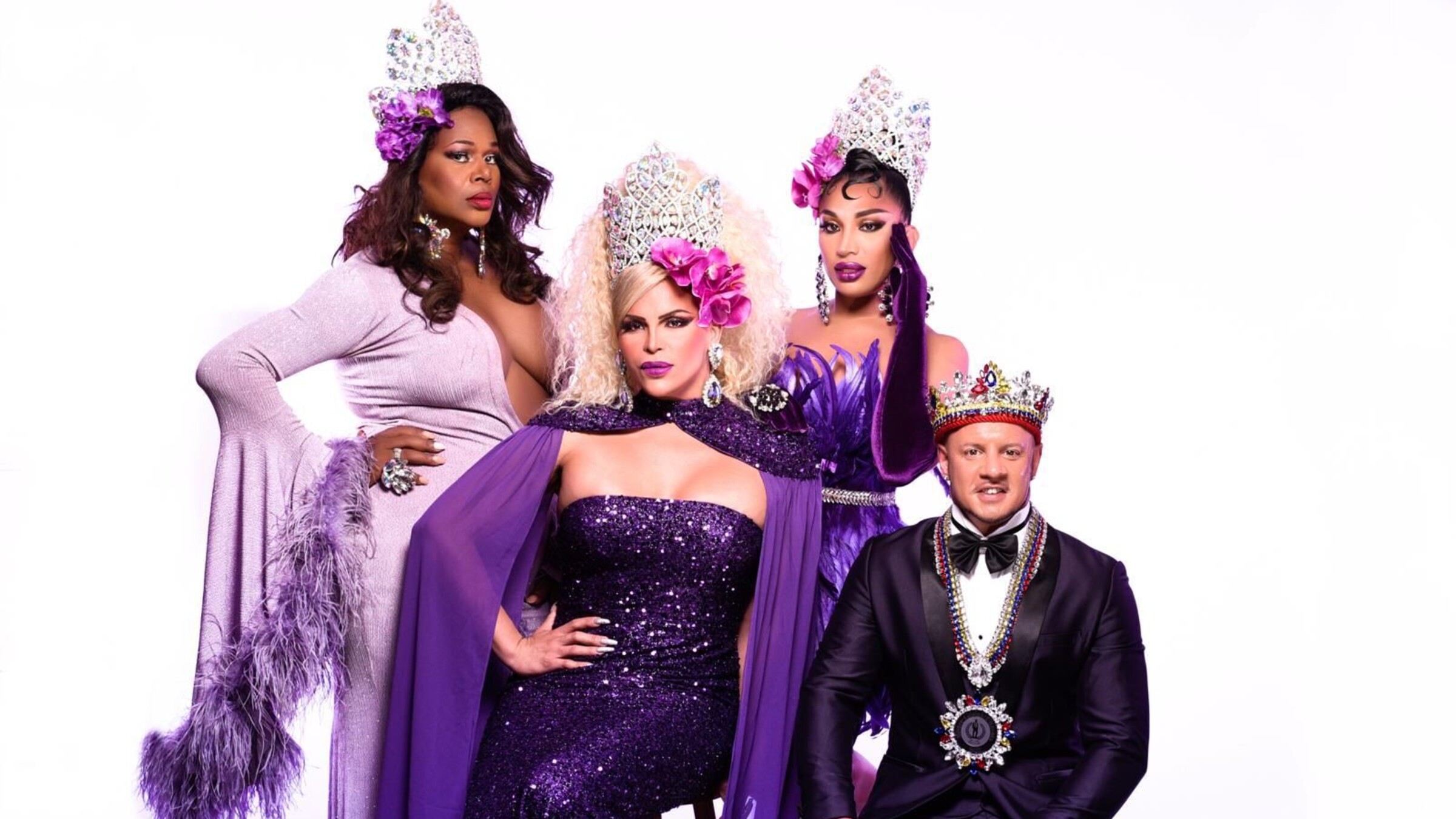 Ivana Black with the Miss Columbia Oneida Court
Ivana Black with the Miss Columbia Oneida Court
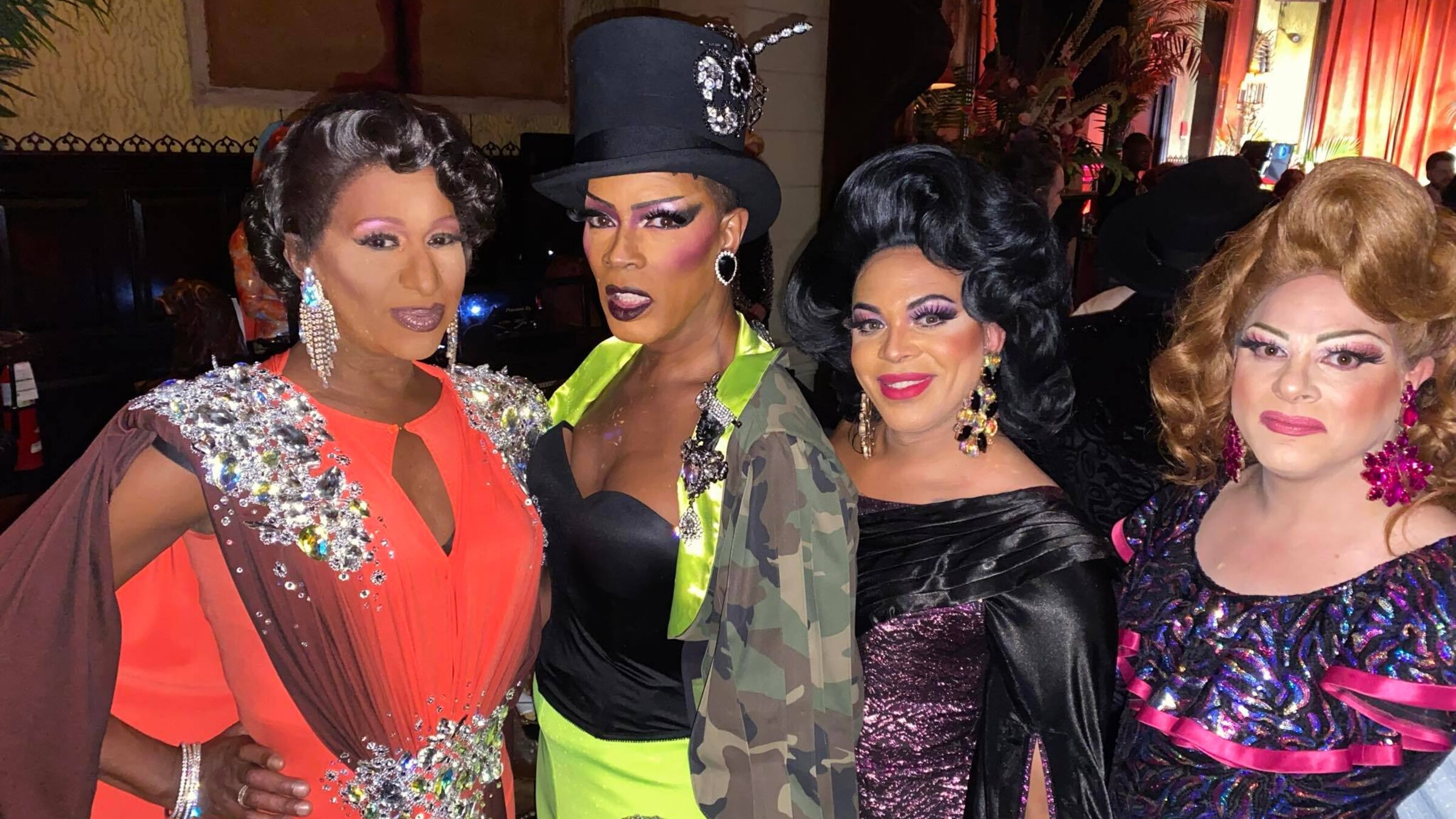 Ivana's drag daughter Duwanna Moore at the LEGENDS OF DRAG Premiere Party
Ivana's drag daughter Duwanna Moore at the LEGENDS OF DRAG Premiere Party
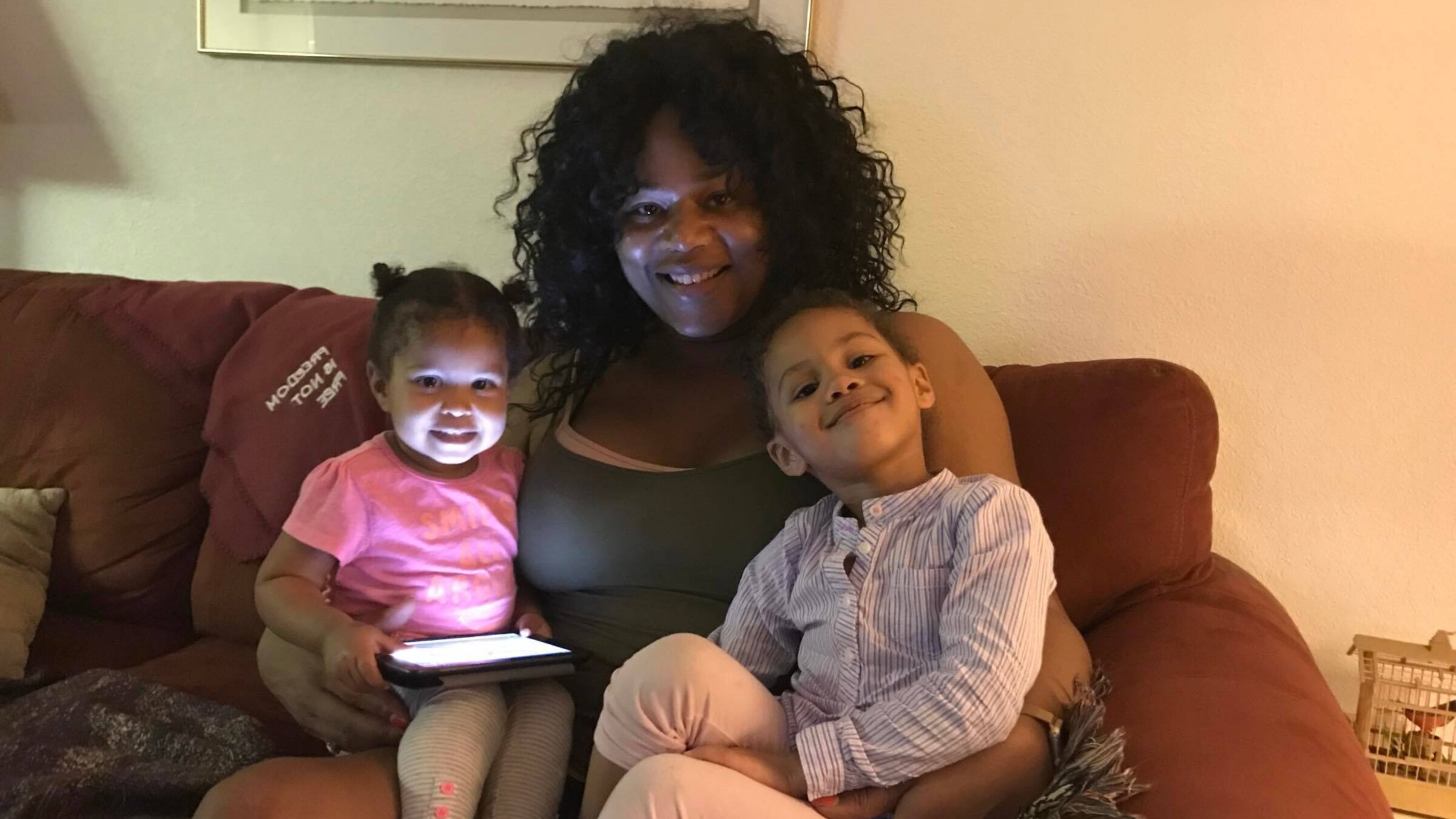 Evanna and her nieces
Evanna and her nieces
recent blog posts
October 03, 2025 | Michail Takach
October 01, 2025 | Bjorn Olaf Nasett
October 01, 2025 | Michail Takach
Paul "Cricket" Jacob: from the farm to the front lines of the fight
The concept for this web site was envisioned by Don Schwamb in 2003, and over the next 15 years, he was the sole researcher, programmer and primary contributor, bearing all costs for hosting the web site personally.
